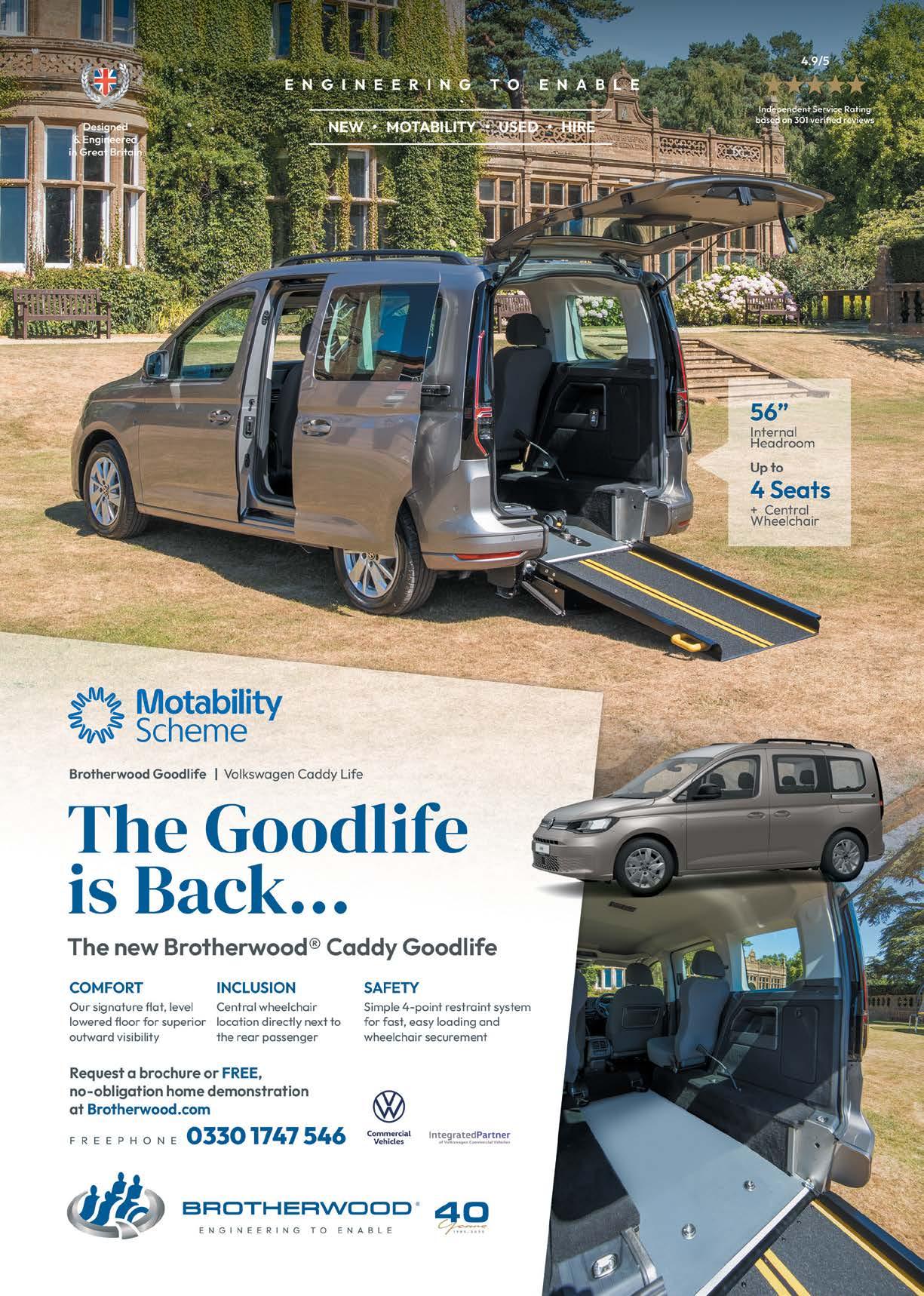














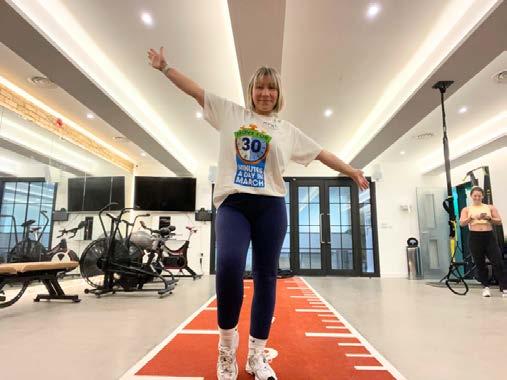

















Page 4-5
Kev’s challenge
Patron Kevin Sinfield CBE raises over £1.3 million for MND charities in his latest challenge
Page 8-9
Symposium 2024
News from the 35th International Symposium hosted in Montreal
Page 13
Prescribe Life
Eleanor Dalley talks about tofersen and recent campaign success
Page 15
From three months to 30 seconds
Richard Cave explains how Ai is transforming the process of voice banking
On the cover: Patient Fellows from the United States. David Busek who is living with MND and his carer Linda Levine, San Jose State University Faculty Emerita and coach in grief and creating a meaningful life. Linda was also a speaker on caregiving at the Allied Professional Forum held during the Symposium on ALS/MND
I’ve had the absolute pleasure of meeting many members of the MND community during my two years at the Association. I’ve talked before about people’s passion and optimism, and their commitment to supporting each other. Above all, what strikes me time and time again is people’s incredible spirit.
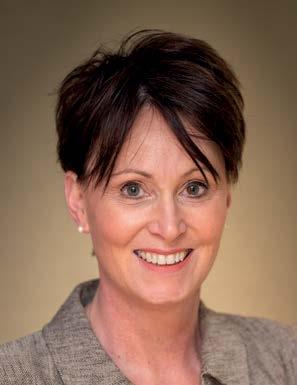
In this issue of Thumb Print you can read about Mark O’Brien who, after his MND diagnosis, set his mind to breaking not one but three Guiness World Records. And then there’s Julie Harris-Hart who captured some of her deepest thoughts and feelings in the stunning artwork she created after her diagnosis. And Tamara who received a grant from the Association to buy a specially adapted saddle so she could continue riding her gorgeous horse Scooby, even when MND started to affect her mobility.
It’s stories like this that constantly remind all of us at the MND Association why we must strive for better outcomes for everyone whose life has been impacted by MND. That drive is apparent in everything we do and is reflected in our new strategy, set to be officially launched in April.
In developing that strategy, we’ve worked to understand what our community needs – in every sphere of our work. We’ve asked, we’ve listened and we’ve heard. Our My MND My Needs survey was our biggest to date of people affected by MND, and revealed five key concerns – access to home adaptations, loneliness and isolation, financial support, impact on young families and acceptance of diagnosis. You can read on page12 and page 31 how we have already started work in some of those areas and there will be a renewed focus throughout this year.
Thumb Print is the quarterly magazine of the Motor Neurone Disease (MND) Association, Francis Crick House, 6 Summerhouse Road, Moulton Park, Northampton, NN3 6BJ Reg. charity number 294354. Editorial and advertising enquiries: Telephone 01604 250505 Email editor@mndassociation.org
If you have comments or feedback about the magazine and its content, please do not hesitate to get in touch.
Thumb Print is available to read online at www.mndassociation.org/ thumbprint
The views expressed in Thumb Print are not necessarily those of the Association. The advertisement of third party products or services does not in any way imply endorsement by the MND Association nor that those products or services will be provided, funded or available via the Association. All content © MND Association 2025.
To do everything we want to do as effectively as possible, we need our voice to be heard. That’s why, this year, for the first time in more than a decade, we’re investing in our brand to ensure it’s working hard for us, raising our profile, encouraging people to support us and opening doors to new partnerships and collaborations to make real change. Thousands of you have already shared your thoughts through interviews, workshops and surveys – thank you for your invaluable insight. We’ll continue to share updates throughout the project.
As always, December was a busy month. You can read about our patron Kevin Sinfield’s remarkable fifth challenge on pages 4-5, our 35th International Symposium on pages 8-9 and our inaugural carol concert on page10, which wrapped up the year perfectly. But of course, we don’t stop – and neither do you! It’s been heartwarming to see all the social media activity as thousands of you have signed up to Join #TeamMND, kicking off the year by pledging to raise money by running, skydiving or organising a quiz. You can find out more on page 6 and read why Debbie, who is living with MND, agreed to be the face of our campaign.
We’re setting ourselves big goals for 2025 but I know, with the support of you and so many others, together we will achieve them and make a difference for everyone in the MND community.
Tanya Curry, Chief Executive
After seven days and 230 gruelling miles, Kevin Sinfield CBE arrived home to a hero’s welcome having run seven ultra marathons in seven regions of the UK, raising more than £1.3million for MND charities.
On Saturday 7 December, MND Association patron Kevin, and his team, arrived in Saddleworth having completed their Running Home for Christmas challenge. This fifth annual 7 in 7 challenge was particularly poignant – the team’s inspiration Rob Burrow CBE died last June.
Throughout the week the MND community supported Kevin every step of the way, turning out in huge numbers in towns and villages across the UK to cheer him on, and by taking part in the Extra Mile events, a highlight of every leg of his incredible journey. Sporting legends, including Liverpool’s John Barnes and Gemma Bonner, Dame Laura and Sir Jason Kenny, ran and cycled alongside Kevin, while Coronation Street actors, Daniel Brocklebank and Peter Ash, attended the Extra Mile event at Manchester’s Etihad Stadium.
On day six, Kevin and his team set off from the MND Association’s offices in Northampton where they heard more about the impact money raised in previous 7 in 7 challenges is having on the fight against MND.
The MND Association’s Chief Executive, Tanya Curry said: “The enormity of what Kevin and his team have achieved is just impossible to overestimate.
“For our community, Kevin and his team are a real beacon of hope. The astonishing amount of money they have raised in Rob’s memory allows us to reach many more people affected by this truly devastating disease, while funding key research projects which give us all the greatest hope for a world free from MND.
“At the same time, the awareness Kevin and the team have raised is making a huge difference, uniting people and turning the spotlight onto a condition which few had heard of just a few years ago.
“We are grateful beyond words for the team’s extraordinary efforts. The outpouring of love and admiration for Kevin has been humbling and is testament to just how much his efforts mean to all of us.”
Half the money raised will be donated to the MND Association, while 22% will go to the Leeds Hospital Charity to help build the Rob Burrow Centre for MND. The remaining amount will be split between the Irish MND Association, MND Scotland, My Name’5 Doddie Foundation and the Darby Rimmer Foundation.
You can still donate by visiting www.donate. giveasyoulive.com/fundraising/kevin-sinfield-andteams-fundraising
And if you’ve been inspired by Kevin and the team to take part in your own 7 in 7 Challenge you’ll find all the information you need to get involved today.
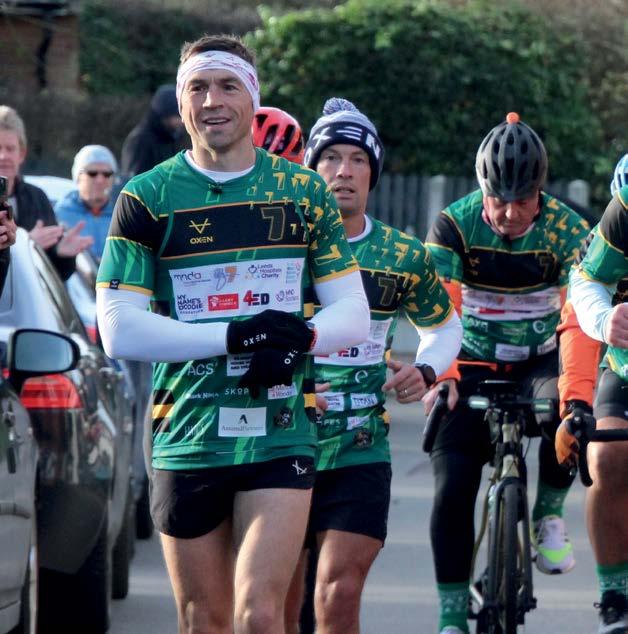
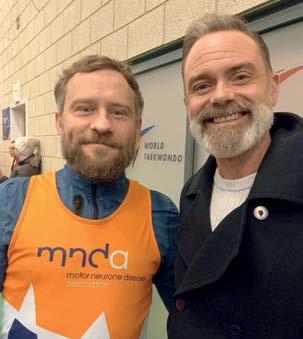
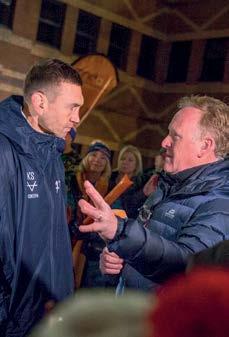

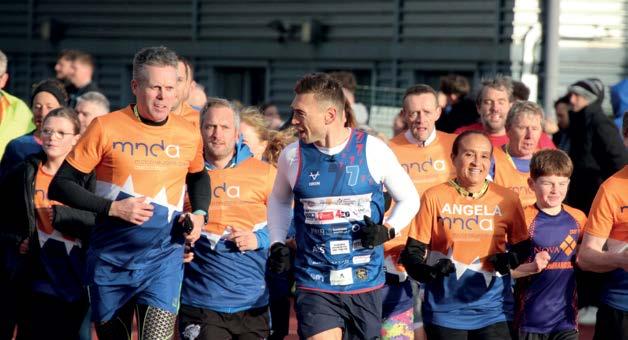
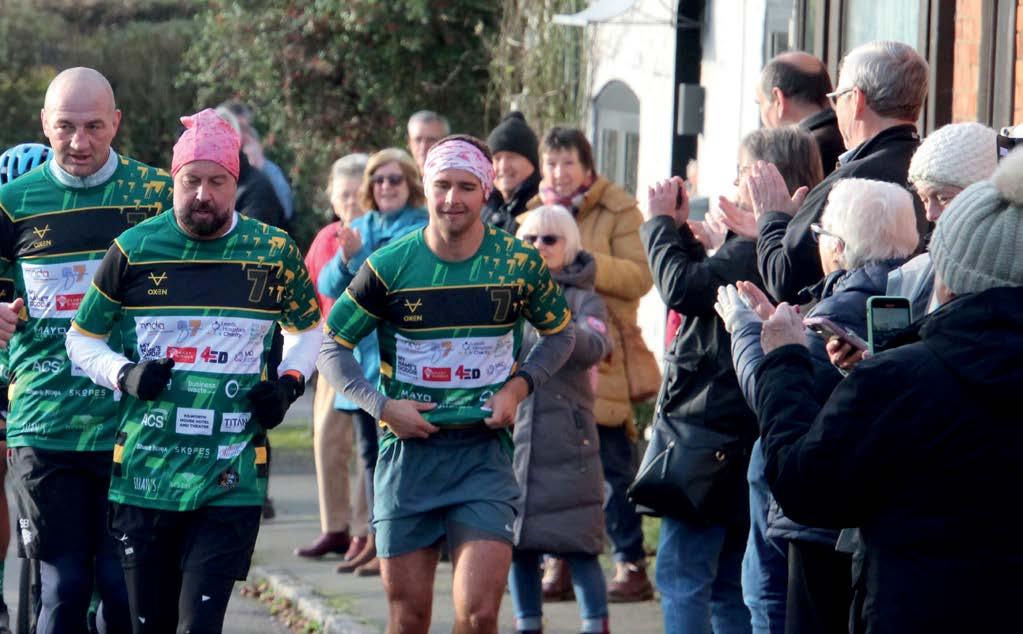
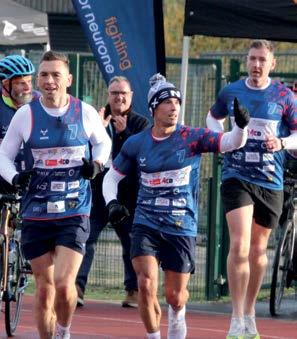

We are grateful beyond words for the team’s extraordinary efforts. The outpouring of love and admiration for Kevin has been humbling and is testament to just how much his efforts mean to all of us.
MND Association Chief Executive, Tanya Curry

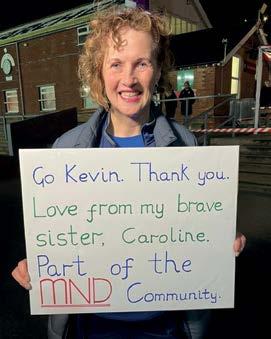
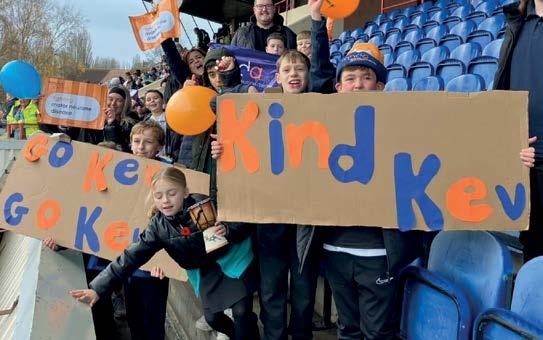
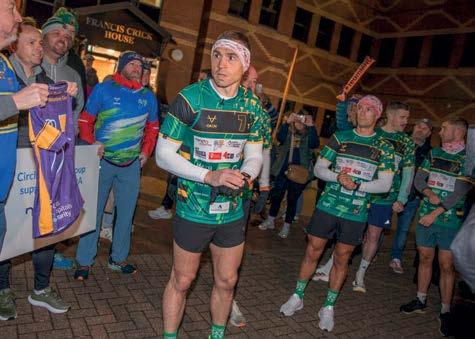
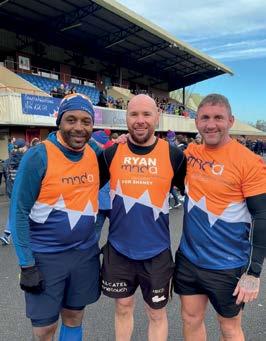
If you’ve been inspired to join #TeamMND this new year every event you take part in and every penny you raise will have a huge impact on people living with MND and those closest to them.
Whatever you’re planning in 2025 you’ll help to create a wave of support, allowing the MND Association to reach more people living with MND, their families, friends and even their colleagues.
This new year, fundraisers are being encouraged to join in by signing up to take part in our range of featured events which include:
• Easter 50 Challenge in Windsor
• Rob Burrow Leeds Marathon
• Peak District Challenge
• Cardiff Half Marathon
• A skydive
• Organising a #TeamMND quiz
Debbie Whitehouse, pictured right with her family, was diagnosed with MND in 2022 and understands the difference every action and every donation – however big or small – can make.
She said: “In 2022, I had the heartbreaking job of telling my family and friends that I’d been diagnosed with MND.
“The MND Association has been there for all of us. From providing me with a stairlift so my son doesn’t have to struggle getting me up the stairs, to supporting me to bank my voice. Their holistic support is only possible thanks to fundraisers like you. Please get involved and join #TeamMND for an event this year.
“The money you raise really will make a difference, not just for people diagnosed with MND, but everyone they love too.”
By joining #TeamMND you will be part of one of the most exciting, supportive and innovative fundraising groups in the UK, all united behind the MND Association’s vision of a world free from MND.
The Association’s Julia Beales said: “Every day in the UK six people hear the words, ‘You have MND’ – devastating news which ripples through to so many others – family, friends, colleagues and entire communities.
“Thanks to our extraordinary fundraisers
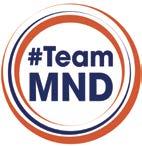
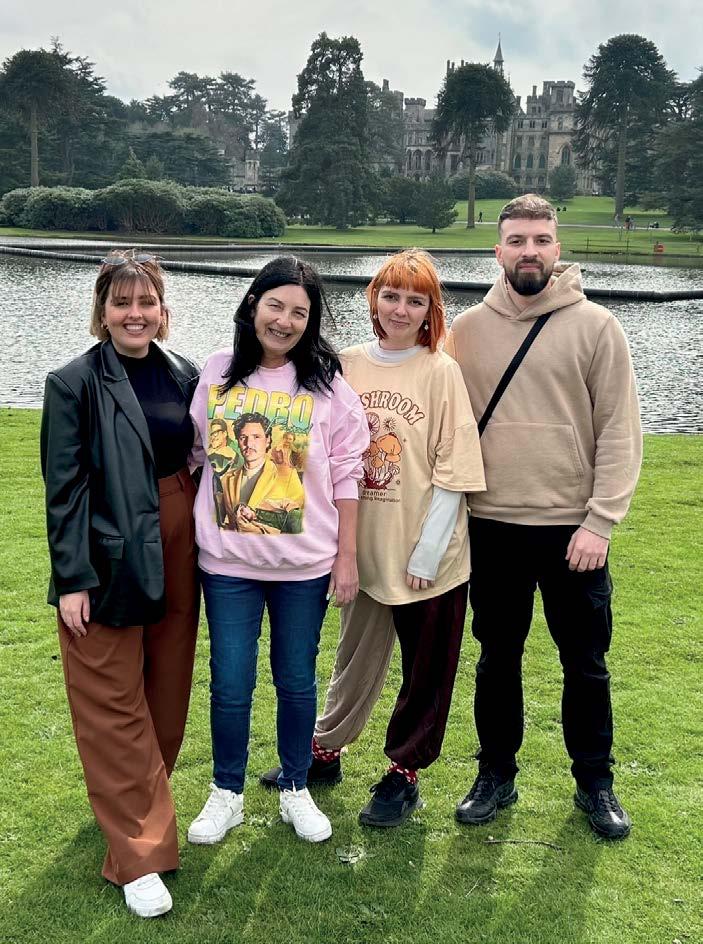
we are able to improve the support we offer to people living with MND, their families and those closest to them while also investing in innovative, groundbreaking research which is taking us ever closer to new treatments and the promise of a cure.
“By joining #TeamMND you will help to support our mission giving hope to so many people affected by this devastating disease.”
For more information about how to get involved visit https:// fundraising.mndassocation.org/ get-involved/take-over-mnd
Thanks to our extraordinary fundraisers we are able to improve the support we offer to people living with MND, their families and those closest to them while also investing in innovative, ground-breaking research which is taking us ever closer to new treatments and the promise of a cure.
Advances in the translational research which is driving forward the fight against MND was the focus of the MND Association’s Countdown to a Cure event which was held at London’s Royal College of Nursing in October.
The evening which was attended by the Association’s Royal Patron, HRH The Princess Royal, celebrated the Association’s commitment to MND research, and highlighted the progress in translational research the charity is supporting. This innovative research, detailed in our Countdown to a Cure report, bridges the gap between laboratory-based research and the testing of potential treatments in people through clinical trials.
We were delighted to have the opportunity to learn more about MND research from the researchers themselves. It’s valuable to hear about projects the MND Association is supporting and progress so far.
The Princess Royal was presented with a copy of the report, and listened to a keynote speech from the MND Association’s Chief Scientist Dr Brian Dickie, highlighting innovative research the charity is funding, the importance of collaboration across MND research, and
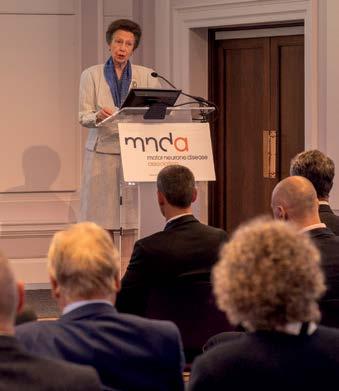
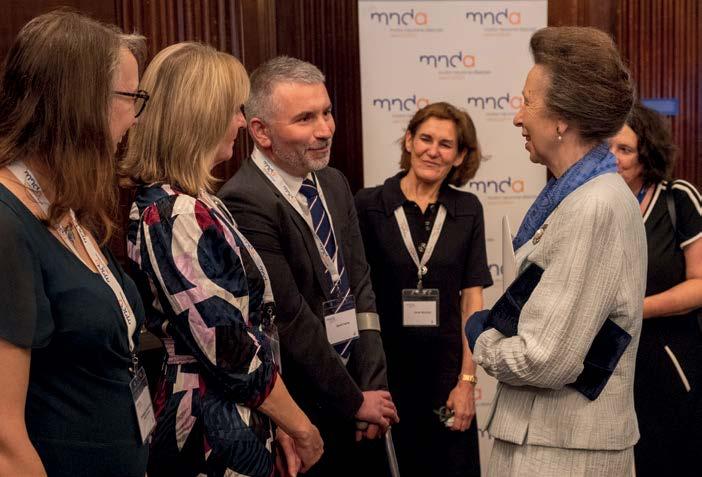
the new and improved ways of carrying out clinical trials.
Her Royal Highness spoke to guests, which included researchers, supporters, partners, funders and people affected by MND. In her speech, Her Royal Highness thanked everyone for their continued support of our ambition to find a cure for MND and highlighted the importance of the need to move research from the laboratory into hospitals as quickly as possible.
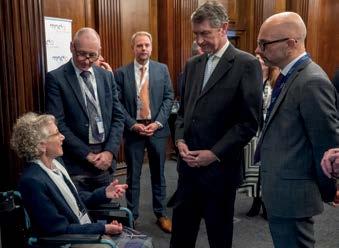
Catherine Mair, who has MND, and attended the event with her husband Alan and their daughters Anna and Olivia, said: “We were delighted to have the opportunity to learn more about MND research from the researchers themselves. It’s valuable to hear about projects the MND Association is supporting and progress so far. Like everyone affected by MND, knowing so much research
and collaboration is going on gives us continued hope for effective treatments and a cure. I am well aware the cure may be too late for me. But I hold out hope for those afflicted in the future.”
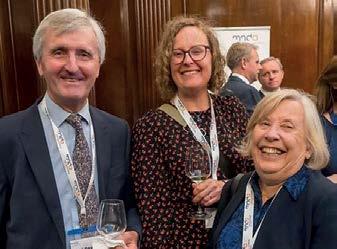
Supporter Jane Sachon, attended with her daughter-in-law, whose father died from frontal lobe dementia and MND. Jane said: “Meeting other people who had been affected by MND and the professional people involved in the research and caring for MND patients was very enlightening and interesting. It was an honour to meet The Princess Royal who was so knowledgeable and committed to supporting research into the disease. We were so impressed by the research and the hope the speakers were able to impart.”
To read our Countdown to a Cure report visit www.mndassociation.org/research/ countdown-cure
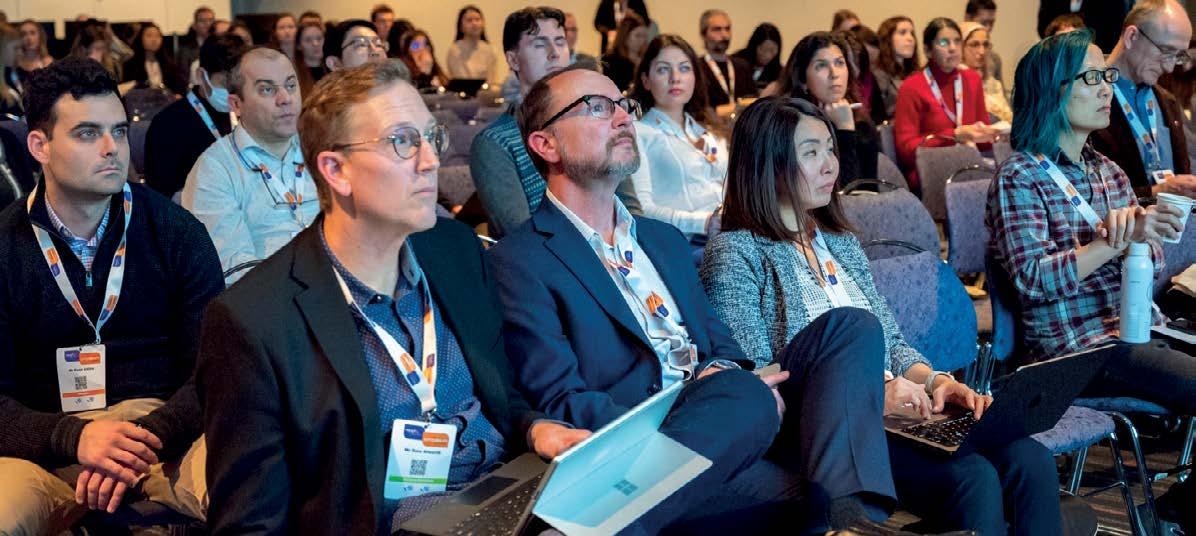
More than 1,500 delegates representing 50 countries came together to listen, learn and collaborate at the MND Association’s 35th International Symposium on ALS/MND in Montreal, Canada.
The annual Symposium, organised by the MND Association, is the largest event in the global MND calendar, bringing together some of the brightest minds in MND research to share expertise and learnings, spark new ideas for research and facilitate collaborations in the worldwide MND community. As ever, the topics under discussion ranged from understanding the disease to discovering effective treatments and improving
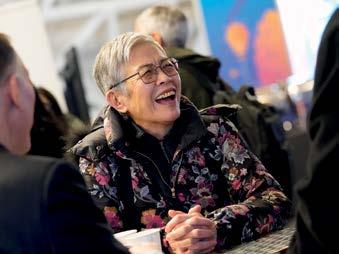
the care and quality of life for people currently living with MND.
This year’s three-day programme, delivered virtually and in person, featured more than 130 talks and 400 scientific posters.
In the opening session, the Stephen Hawking Memorial Lecture, Professor Timothy Caulfield from the University of Alberta, discussed the issues surrounding misinformation and the way health myths can affect perception and policies of day-to-day life.
Professor Douglas McKim from the Ottawa Hospital in Canada opened the
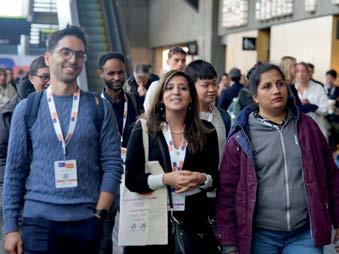
session on respiratory management. His talk covered current developments and research into improving a form of breathing support called non-invasive ventilation, which has been shown to have a positive impact on survival for people with MND who have breathing difficulties. His talk featured data and evidence that supports adjustments to the current ventilation methods including the best time to introduce ventilation.
Following last year’s session led by Professor Merit Cudkowicz on the Phase 3 trial results of tofersen, a treatment for people with SOD1-MND, and the potential benefits of early intervention
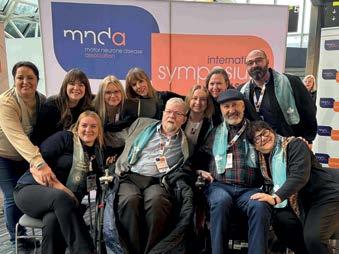
on survival rates, Dr Stephanie Fradette presented updates on the Phase 3 ATLAS trial. The trial is investigating the effects of tofersen in people with a SOD1 gene change who are showing no signs of MND (pre-symptomatic). The trial will monitor pre-symptomatic carriers of a SOD1 gene change and administer tofersen as early as possible when symptoms of MND develop. The study aims to better understand if giving a treatment before the onset of disease can delay or prevent symptoms.
During the closing session, Dr Angela Genge discussed the different measures which can be used in clinical trials to determine whether or not a potential treatment is benefiting people with MND. She discussed how these could be
PROMISE 1 WE WON’T REST UNTIL MND IS TREATABLE AND ULTIMATELY CURABLE
improved to give a better indication of the effectiveness of potential treatments.
hall
More than 400 posters were on show, giving researchers the opportunity to share and discuss their work and identify collaborative opportunities with other teams.
Next year’s International Symposium will be held in San Diego, USA in December.
For the very latest news, visit www. mndassociation.org/symposium
For more information about the research shared at the Symposium, or the very latest on MND research, head to the research blog at https://mndresearch.blog
“I like being at the Symposium learning new things we can take back to try to get better services in Iceland for MND patients. We are also getting closer to a solution on how to cure MND.”
Patient fellow, Gisli Jonasson
“What keeps me coming back is this wonderful combination of the science and the clinical research that’s being shared on this international platform. It’s a wonderful place to meet international researchers.”
Dr Rachel Tan, University of Sydney
This is a fantastic conference for me, I particularly like to discuss new research and ideas. It’s all about meeting fellow researchers in the field and trying to come up with new ideas.
Dr Emmet Costello, Research Fellow at Trinity College Dublin
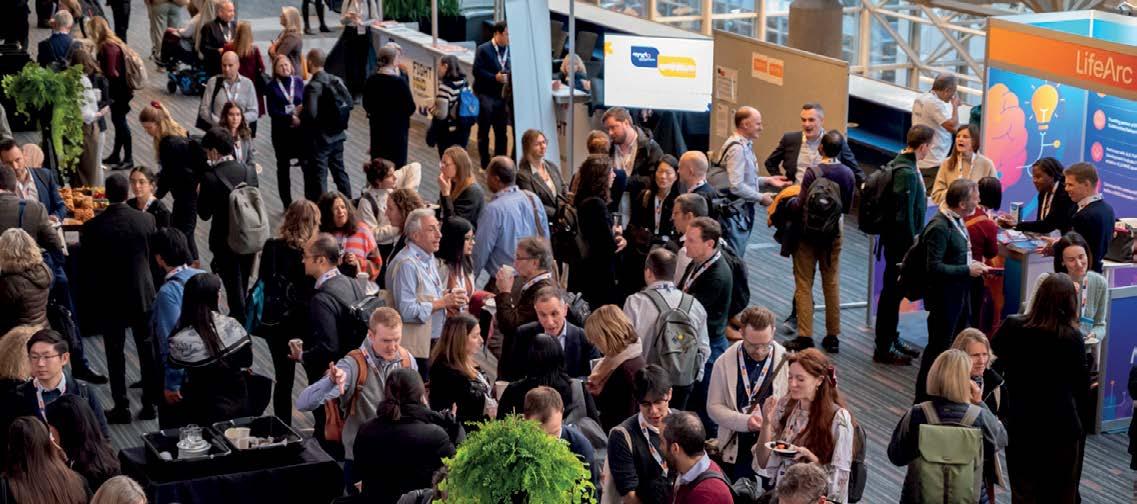
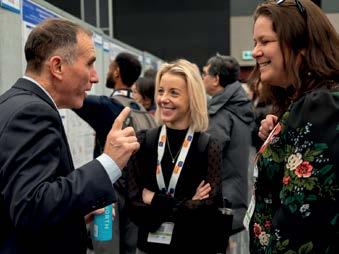
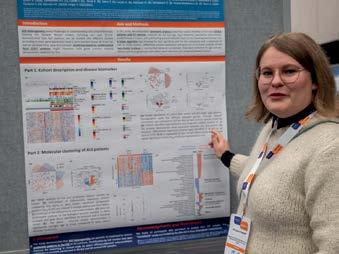
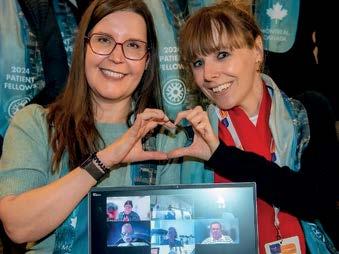
The MND community was joined by stars of stage and screen for the MND Association’s inaugural Christmas concert in December.
Association patron and presenter of Good Morning Britain Charlotte Hawkins, actress Dame Penelope Wilton and comedian Jon Culshaw were among those taking part in the celebration, which was held in the beautiful surroundings of St Mary’s Church in Marylebone, London.
Eleanor Dalley who is living with MND, gave a reflective reading and told the congregation about her family’s struggle with the SOD1 variant of MND. She also explained how tofersen has helped slow the progression of the disease.
The MND Association’s Chief Executive, Tanya Curry said: “Our Christmas concert was a wonderful way to round off the year and bring our incredible community together in the most beautiful of surroundings.
“As well as allowing us to raise awareness of motor neurone disease, with the support of so many people living with MND and the support of our
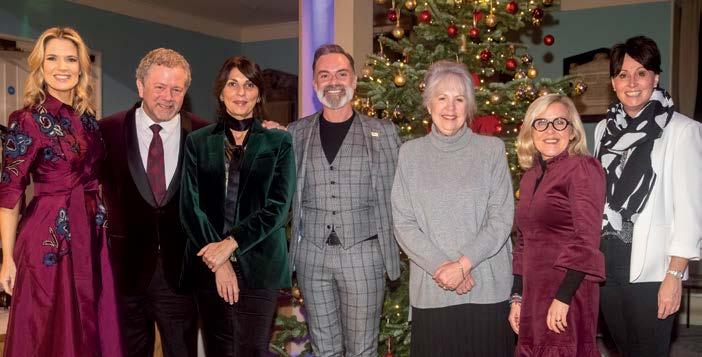
special guests, we were also able to look back on our community’s achievements while looking forward with a great deal of hope.”
Guests enjoyed Christmas songs and carols performed by the London International Gospel Choir, and there were readings from actress Gina Bellman and Coronation Street actor, Daniel Brocklebank who featured in the soap’s MND storyline earlier in the year. Lucy
Hawking, daughter of the late Professor Stephen Hawking, was also in attendance, giving a reading which particularly resonated with her and her family.
Our Christmas concert for 2025 will take place on Tuesday 16 December. For more information visit the MND Association’s social media channels on X, Facebook, Instagram and LinkedIn.
Nick Smith has agreed to share his story as his MND progresses to raise awareness about the profound impact on him, his loved ones and home life.
Nick lives in Romsey, Hampshire with his wife of 38 years, Jackie. His story offers an unfiltered look into life with MND, highlighting the personal and emotional
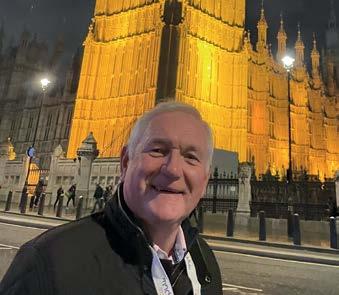
challenges it brings. He was diagnosed in April.
Nick said: “By the time I saw the neurologist, the diagnosis was devastating – ‘you’ve got motor neurone disease.’ It hit me like a freight train.”
MND has altered every aspect of Nick’s life. Simple tasks, such as drinking a cup of coffee, now require adaptations. He said: “My grandson loves that we both use two-handled ‘sippy cups’. He drinks faster than me, but we laugh about it.”
“With help from the MND Association, we’ve renovated our family bathroom into an accessible one which is safe for me to use.”
For Nick’s wife, Jackie, the changes are equally significant. She reflects: “Seeing Nick struggle is heartbreaking: but we’re a team. I help where I can – drying him after a shower, cutting his food, even pinning on his MND badge. It’s just what
you do for someone you love.”
Nick remains determined to live fully. “Every day is a fresh day. Waste not a moment,” he says. Nick walks two miles daily and pedals on a stationary bike. Reflecting on his resilience to keep going, he said: “I am nothing but totally positive about continuing until I can no longer physically do it. I think it’s vital people make the most of the time they have. Mental stimulation and the feeling of selfworth is important to one’s state of mind and confidence.”
Over the coming months, we’ll continue to share Nick’s journey. He says: “If others can take something from my approach, then I may have succeeded in bringing some hope to people’s lives and those of their carers.”
Follow Nick’s journey on the Association’s social media channels and in future editions of Thumb Print.
A diagnosis of MND can leave people with more questions than answers. In one moment, their world is turned upside down, their future uncertain. Many are unsure what to do next and what support is available. Family and friends may feel just as confused and not know where to turn.
MND Connect, the Association’s dedicated helpline, is here to help. The trained team of experts can provide information, practical and emotional support, and guide people to other specialist services when needed.
MND Connect is busier than ever with questions about financial support and benefits, a need for emotional support and queries about the Association’s services the most popular topics.
Some calls can be very difficult, but we always aim to support the person we are speaking to to the point they leave the call feeling a little better than when they first called.
To meet the increasing demand, the team has grown, as MND Connect Manager Victoria Meynell explains: “To manage the growing number of calls, we now have six MND Connect Advisers who bring a broad range of expertise including teaching, nursing, mental health support and also personal experience of MND.
“That wealth of experience helps us provide wide-ranging support – and that’s vital because the calls and emails are very varied. We may get a call from someone living with MND who wants to know what technology is available to help them communicate as their speech deteriorates. Or it might be an email from someone who is looking into continuing healthcare funding. Or it might be a from a school secretary wanting to know how to support a child whose parent is living with MND.”
MND Connect ‘connects’ people to all the services the Association offers, while

also signposting to other services and organisations which may help. Victoria said: “Contacting MND Connect is a really easy way into the charity’s support services. We can talk people through all the ways the Association can help and how they can access that help.”
The team also provides emotional support and will stay on a call as long as they are needed.
Victoria says: “Some calls can be very difficult, but we always aim to support the person we are speaking to to the point they leave the call feeling a little better than when they first called.
“Some people simply call to chat to someone who understands. Calls range from a quick five minutes with someone wanting help applying for one of our grants, to a much longer call speaking to a carer who has been recently bereaved. There is no time limit.”
Insights from calls are used to inform the Association’s support and also help
understand the provision of services across England, Wales and Northern Ireland as Victoria explains: “The calls help improve our understanding of what is happening nationally. We are experiencing the highest number of calls since the service started in 1992. This may be influenced by the cost of living crisis, but it also provides an insight into how national services are operating, and the additional support people are seeking.”
MND Connect is available Monday to Friday between 9am - 4pm. Calls to this number are free from landlines and mobile phones within the UK and are confidential and do not appear on itemised bills.
Call us: 0808 802 6262 Email us: mndconnect@ mndassociation.org
The MND Association has increased its Cost of Living Support Fund, available to people struggling with household bills and shopping costs, to £500.
The uplift marks a £150 increase, with those who have already received the previous amount of £350 eligible to apply for the difference should they need to.
The Fund, which launched in 2023 when the cost of living crisis began to pinch family budgets, is not means-tested and is available annually to people living with MND or Kennedy’s disease who have a confirmed diagnosis or suspected diagnosis from a health professional.
Sally Hughes, Director of Services and Partnerships at the MND Association, said: “People shouldn’t have to worry about whether to eat, heat their home or turn on vital equipment. We hope this uplift will go some way to easing the burden of covering essential bills, particularly during the colder months.”
People shouldn’t have to worry about whether to eat, heat their home or turn on vital equipment.
Over the past five years, the MND Association has grown significantly. And we have ambitious plans which will be shaped by our strategy, set to be officially launched in April.
Our brand – the way we represent ourselves – has a vital role to play. Over the last three months we have talked to thousands of people including you, our members, to hear how you feel about the Association, whether what you see is reflected in what you experience, and the way you’d like to see the Association express itself in the future.
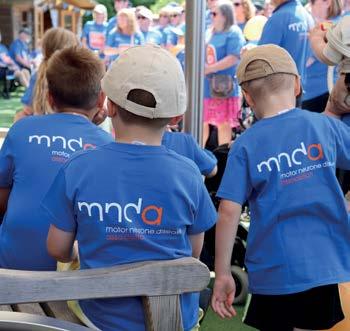
The insight we’ve gained through those conversations, workshops and surveys will now be used to consider how the brand can help raise more awareness, encourage more support, strengthen our opportunity to influence and create more research and care partnerships.
There will be further updates in future issues of Thumb Print
Living alone with MND or Kennedy’s disease
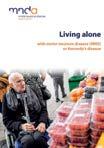
A new booklet on planning ahead if you have been diagnosed with either of these conditions, but don’t have practical or emotional support at home.
See our article about the launch of this booklet on page 31.
Kennedy’s disease
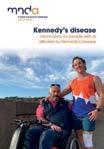
A new booklet to help if you have been diagnosed with Kennedy’s disease. Find our information about this condition at: www. mndassociation.org/kennedys
See our article about Kennedy’s disease on pages 20-21.
Sex and relationships
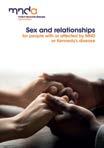
We have updated our guidance to support intimacy, whether you are in a couple or single, and regardless of sexuality. Find more on emotional support at: www. mndassociation.org/emotions
Revisions
The following information sheets have been updated:
· 10A Benefits and entitlements
· 10E Work and MND
Information for professionals
We also offer resources to health and social care
professionals, to help them provide tailored support: An introduction to Kennedy’s disease
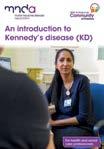
Our new booklet helps health and social care professionals address the complex needs of people living with Kennedy’s disease.
How to find our information
Find our resources, including for professionals and researchers at: www. mndassociation.org/ publications or order printed copies from our MND Connect helpline: 0808 802 6262, mndconnect@ mndassociation.org
To search for our resources
by need, use our Care information finder at: www.mndassociation.org/ careinfofinder Our information development is accredited through the PIF Tick scheme. This means our resources are evidenced, user tested and reviewed by experts.
Help our information development
We work alongside people with MND or Kennedy’s disease, and their carers, to develop and improve our information in a range of formats. Join our user reviewers and make a difference from the comfort of your own home. Find out more from: infofeedback@ mndassociation.org
Eleanor Dalley is one of up to 100 people in the UK living with the SOD1 genetic variation of MND. She played a key role in the MND Association’s successful Prescribe Life campaign. Here, she shares her story.
I wanted to take a bit of time to reflect on the recent decision by NICE to change its routing of the drug tofersen, a drug that helps the two per cent of people with MND who have the SOD1 gene variation. I was diagnosed in 2019, and confirmed as having the SOD1 gene variation in early 2020. I’m the fourth member of my family to be diagnosed and the only one still alive.
I had to fight to get access to tofersen, first being told I wasn’t progressed enough – I wasn’t ill enough to be given it while it was in a trial. Anyone who knows me, knows I wasn’t going to accept that and I continued to challenge and fight for access to this life changing drug.
I took matters into my own hands in the summer of 2022 and wrote directly to the consultants leading the initial trial. They thankfully wrote back and within a month, I was accepted for the early access programme at Kings College Hospital.
Having fought hard to get this drug, when I heard that NICE wasn’t going to assess it down the most appropriate route, I knew I couldn’t just sit back and let that happen. Tofersen has been a complete game changer for me and others, it has literally given us life. I wanted to do something to ensure that it becomes available on the NHS for everyone living with the SOD1 gene variation should they develop MND. I had to fight for others –not just my family who may be affected in the future but for other families who may be affected. It just didn’t sit right with me that I could have it but that maybe others in future might not. So, I contacted the MND Association and a number of leading MND consultants to ask what we could do together to affect this decision.
After a number of emails and meetings we agreed to join forces and set up a working group with the key aim to influence NICE and get it to change its decision on routing. It was great to be a part of this group, everyone brought something different and I was proud to be

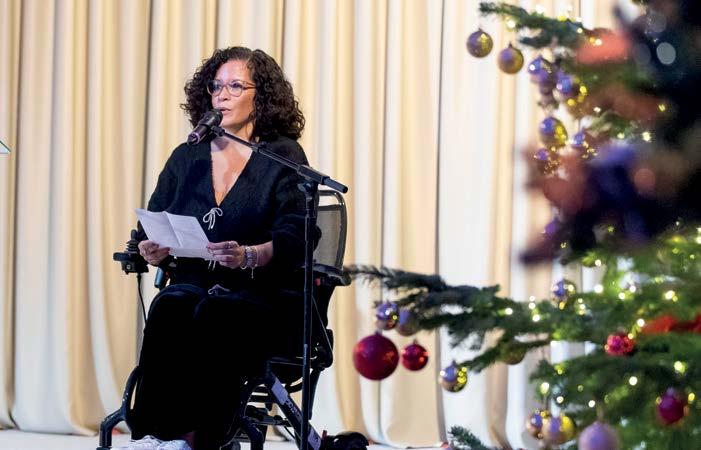
the person bringing lived experience to the table.
We worked for many months, meeting weekly to discuss actions to influence NICE. It became clear early on that things wouldn’t change overnight. I have to say I have learnt so much from my fellow participants in the group around policy, campaigning, how the medicine approval process works etc.
I knew I couldn’t just sit back and let that happen. Tofersen has been a complete game changer for me and others, it has literally given us life.
It has been both fascinating and frustrating in equal measures. Despite the hard work being put in by everyone, NICE was not budging, so we agreed as a group that a public campaign was now necessary. I agreed to be the face of the campaign. This was daunting at first. But I had to put my nerves aside because this was so important to everyone in the MND community. It wasn’t just about tofersen. It was about fighting to ensure our community has access to medicines now and in the future. Tofersen just happens to be the first one. There will be more, I’m sure of it.
We launched the public campaign with a petition on 17 October and hit our first milestone of 10,000 signatures within a week of launch. It was truly humbling to see everyone get behind the campaign and share this far and wide across the globe. I’ll be forever grateful to everyone who signed and shared our petition.
I can’t tell you the emotions I felt when I heard that NICE was going to discuss the routing of the drug again at a meeting at the end of October. As a group we couldn’t share this information at the time as there was no guarantee of a positive outcome, but we were quietly optimistic.
We were then left on tenterhooks for a few weeks before hearing the outcome on 18 November that NICE had agreed that tofersen should be put down the HST route to drug approval. A much more appropriate route for this very special drug. It was an emotional morning knowing that our campaign had been successful, so quickly.
I’m thankful to NICE for changing the decision and to my fellow working group members for all their hard work in driving the actions that lead to a successful campaign. The fight isn’t over yet though, getting NICE to change its decision was only the first step. We now need Biogen to begin the approval process that will hopefully lead to tofersen being approved for use on the NHS for all those who need it – now and in the future.
Did you know our amazing volunteering network includes 87 branches and groups across England, Wales and Northern Ireland? That’s around 1,300 volunteers supporting people with and affected by MND.
The final quarter of 2024 saw the Association host a series of engagement events to connect directly with our branch and group volunteers. The events also gave our volunteers the chance to meet each other to share ideas.

Attendees at our online webinar in October heard from two of our directors – Jo Coker, Director of Income Generation and Jo Mountney, Director of People, Culture and Inclusion – about key achievements, and the Association’s priorities for the coming year.
Further Let’s Talk events hosted by members of our Executive Leadership Team will be held in 2025. Look out for invitations in our fortnightly volunteer newsletter, The News
Our MND Volunteers Facebook Group is a dedicated online space for volunteers who support branches and groups across England, Wales and Northern Ireland. The Group now has more than 120 active members who regularly share volunteers’ achievements and events in their areas, sparking conversations, ideas and collaborations.
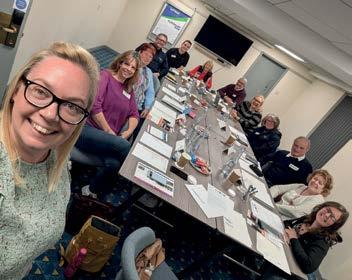
Kate Bryon, Chair of the Cardiff and Vale of Glamorgan Branch, posted this photo to the Group of a get-together she organised alongside the South East Wales and South West Wales branches. Volunteers shared their experiences of fundraising and awareness raising, along with personal stories of their volunteering journeys for the Association.
If you’re interested in joining the Group and reading more about our volunteers’ work, please request to join by visiting Facebook.com/groups/mndvolunteers
Collaboration with, and providing support for, our volunteers is so important. In our North region, volunteering staff have established Get Connected networking events to share good practice between local branches and groups.
A total of 28 people, including 20 branch and group volunteers, attended the first event in the North West, organised and hosted by Community Support Coordinators –Andrea McEntee, Grace Kay, Paula Sutton and Sue Muller. Andrea said: “The event was a great success and we hope to hold more going forward.”
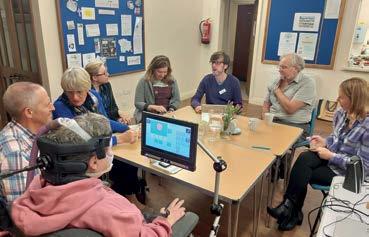
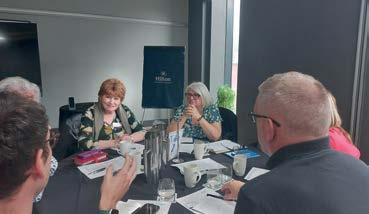
In West Yorkshire, St Mary’s Church in Boston Spa was the setting for a similar event. Alongside speaking to national office staff, local branch and group volunteers heard a presentation on recent research related to people who have played certain sports.
Volunteers visited Francis Crick House in November to take part in our Branch and Group Officer Engagement Day. This was in response to feedback asking for branch and group members to be given the opportunity to learn more about the work done at our central office.
Attendees took part in networking sessions in the morning, discussing subjects including the annual transfer, communications and fundraising. After lunch, teams from Research, Finance, Fundraising and Support Services presented on their areas. Following positive feedback, we will host more of these events in the future.
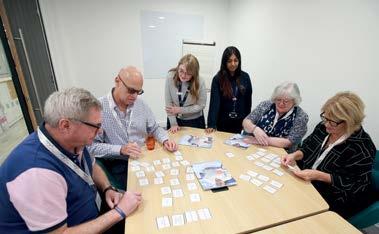
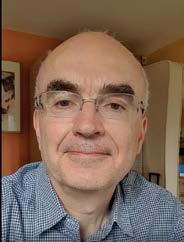
By Richard Cave, Speech Therapist at the MND Association and Research Fellow at University College London
I joined the MND Association on a secondment from the Royal Hospital for Neuro-disability in 2017, tasked with supporting the Communication Aids Service to create a network of voice banking volunteers.
The team helps people living with MND to bank their voice. This is then used to create a synthetic approximation of their natural voice to be used with communication aids if or when their speech is affected by MND.
Back then, voice banking was a big task. 1,600 random phrases had to be repeated with no promise of how good the results may be. By the end of 2018, the average time a person took to bank their voice was three months.
Today, voice banking can be completed in just 30 seconds. By the time you get to the bottom of this article, you could have banked your voice. However, I should add that to get the best quality voice bank (especially for speech with an accent), a recording of your voice that is at least 10 minutes or longer is required.
What has happened? In two words: Artificial Intelligence (AI). AI is helping to make voice banking quicker, more
Nickie, recently used her preMND voice recordings to update her banked voice, with the latest AI technology. She said: “I had previously tried to bank my voice using my voice notes, but it didn’t sound like me as I didn’t have enough minutes. But Richard and the MND Association suggested I try again with this more advanced technology and I’m delighted with the outcome. It has made me sound like me again.”
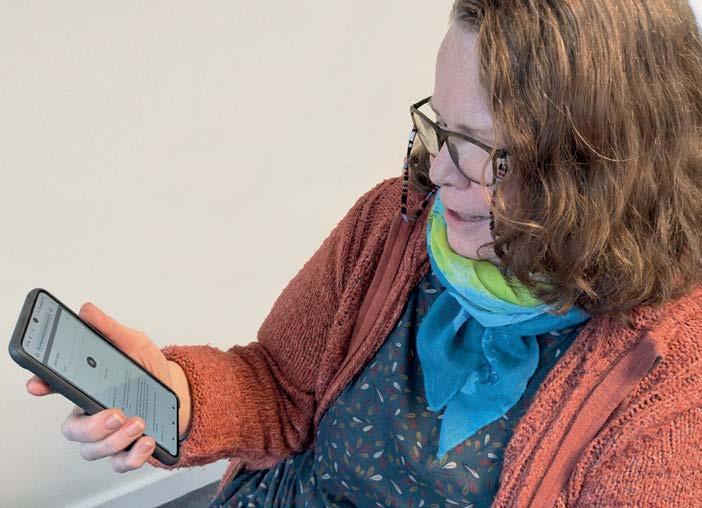
accurate, with far less effort required from people with MND.
In my time with the MND Association, I’ve trained more than 3,000 professionals in voice banking and I support people living with MND to voice bank every single day.
The MND Association funds most of the popular voice banking technologies. To receive an information sheet on all the options, or if you have any questions, contact communicationaids@ mndassociation.org
To hear my banked voice reading this article, please scan this QR code.
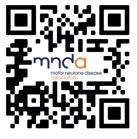
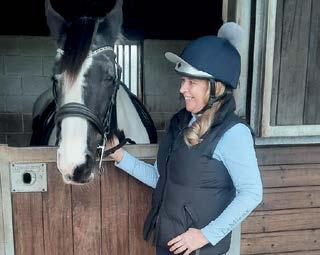
• Voice banking is developing very rapidly. To take advantage of this, record yourself reading a book or having a conversation in a quiet place, ideally for 30 minutes, on either your phone or tablet. Save the recording to voice bank now or in the future.
• If your voice is changing or has already changed, you can use 30 seconds or more of any recordings you have of your voice to create a voice bank. These could be WhatsApp voice messages, voice notes or videos – basically anything with your voice and minimal background noise. The best quality voice bank requires at least 10 minutes of recordings.
• You can now voice bank in 32 different languages. And if you voice bank in one language you can ‘speak’ in any of the other 31. This is great for people who speak in more than one language.
• If you don’t have a speech and language therapist and you feel your voice is changing ask your health and social care professional for a referral.
Just a few of the highlights made possible with your amazing support
24* multidisciplinary MND Care Centres and Networks provided care for 3,924 people with MND
368 trained Association visitors and co-ordinators supported people affected by MND
1,480 healthcare professionals attended events to learn, network and improve MND care
Over £3.1 million of support grants were awarded to over 3,000 people affected by MND
£21.5 million was the total value of our research grant portfolio (at 31 May 2024)
Over 1,500 people attended our Symposium on ALS/MND in Montreal in person or online
£3.7 million of eligible state benefits were enabled to be claimed through our Welfare Benefits Service
7,896 people affected by MND accessed our MND Connect helpline
* Derby and Nottingham became two separate MND Care Centres in 2024
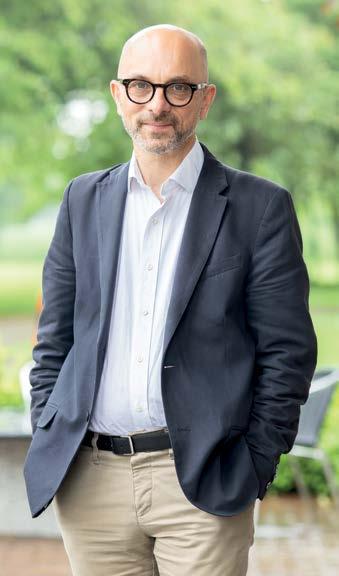
Over £20 million was raised by the Association in 2024 with your incredible support
As the chair of a board of a growing and ambitious charity, I feel privileged to be involved in so many different opportunities, attend inspiring events and work with hugely dedicated people. But without doubt, my favourite part of the role is meeting people from the MND community. Your inspirational stories, your challenges and your issues are what I take into every board meeting and every conversation with Association staff, so we can work together to learn, understand and improve.
In fact, one of my personal highlights from last year was the beautiful reading by Eleanor Dalley at our very first MND Association carol concert, hosted by our wonderful patron Charlotte Hawkins. Eleanor also fronted our Prescribe Life
campaign (see page 13) which resulted in the drug tofersen being given the best possible chance of becoming available to people with SOD1 MND – most definitely one of our success stories of 2024.
That campaign, along with the collaborative conversations at our International Symposium on ALS/MND in December, and the latest fantastic 7 in 7 challenge by our patron Kevin Sinfield CBE, marked the end of another memorable year and has given us an incredible springboard into 2025.
This will be the year we launch our new strategy and with it a host of programmes and activities to support our community. Collectively we will drive towards our goal of meeting needs today as we stretch towards the achievement of that ultimate goal of consigning MND to history.
A new 18-month research project will investigate whether professional footballers face a higher risk of developing MND.
Funded by the MND Association, My Name’5 Doddie Foundation, and the Darby Rimmer MND Foundation, the study will analyse death certificates of footballers in the UK and Italy to assess if they’re more likely to die from MND compared to the general population.
The study, led by Professor Ammar Al-Chalabi of King’s College London and Dr Elisabetta Pupillo from the Mario Negri Institute for Pharmacological Research in Milan, is one of a number aiming to understand more about the impact of lifestyle on a person’s chances of developing MND.
Previous studies have suggested that professional footballers may face a higher risk of MND, with some reports indicating a sixfold increased risk. However, other studies have found exercise might not raise the risk, and may even offer protection.
This new investigation builds on
those previous studies, and extends the research into larger populations, by including data from Italian footballers in Serie A and B, and UK footballers from the Professional Footballers’ Association.
If we show it does increase the risk, we have to be very clear that the lifetime risk of MND is about one in 300.
If a link is found between football and MND, it could lead to safety recommendations for football governing bodies. However, Professor Al-Chalabi has emphasised that even if a link is discovered, the overall lifetime risk of MND remains low, and the health benefits of exercise far outweigh the risks.
Prof Ammar Al-Chalabi, Professor of Neurology at King’s College London said: “If we show it does increase the risk, we have to be very clear that the lifetime risk of MND is about one in 300.
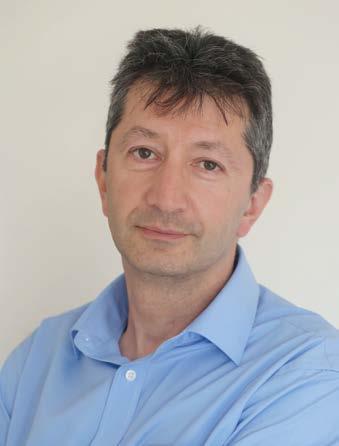
Any findings from this study are limited to professional footballers and not the general population. The risk of heart disease, stroke or cancer – which exercise protects against – is about one in three each. These are common and serious risks to your health; you need to exercise.”
“I want to help people find their ‘Stephen’ moment”
When Liz Ellis’s son Stephen was diagnosed with MND, Liz cared for Stephen at home until the very end. Alongside caring for him she tirelessly fought to ensure he received the best possible treatment by the NHS.
Now she uses that same energy to ensure people living with MND can live as well as possible, as a trustee of the MND Association.
Liz explained: “Stephen was in hospital for a very long time. Before he was discharged the nurses took him outside for a trial run. I’ll never forget how he looked up to the sky and said how beautiful it was. It dawned on me how vibrant life becomes when you have a terminal condition.
“There is so much I’ve learned caring for Stephen and I’m pleased I can use this knowledge to benefit others. Many of us on the Board have personal experience of MND. This knowledge and experience
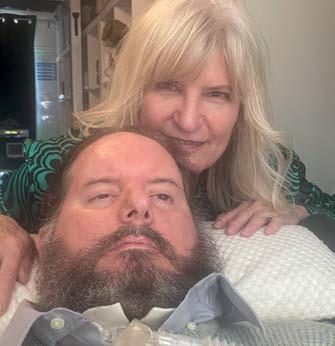
helps us to ensure the MND Association is focused on the things that will make the most difference to those we support.
“I want people to know that they’re not alone. That the Association is here for them. There can be a perception that life is over with a diagnosis of MND, but
I believe you can still find comfort and peace, and even joy while living with it.
There
is so much I’ve learned caring for Stephen and I’m pleased I can use this knowledge to benefit others.
“Over the years things have changed so much. A person diagnosed today has more options available to them than those 20 years ago. Voice-banking, interventions like NIV and peg feeding, and multi-disciplinary care have all helped improve quality of life.
“The ripple effect of MND is far reaching, so it is right we support everyone touched by MND and help them to find those ‘Stephen’ moments when they are able to look up into the sky and see beauty.”
It could be time to update your Will
The new year is often the time when many of us pause to reflect and make new priorities for the year ahead.
Whether you’re keen to get on top of your life admin, or if your plans include a life-changing event, such as a change in your relationship, starting your own business or moving house, it makes sense to make a Will at the same time.
At the MND Association we make the process even easier by offering a Free Will Service for people affected by MND and our supporters, via the National Free Wills Network. If your plans also include supporting the MND Association and the work we do, we can give you the information you need to help you leave a lasting legacy for the future.
Emma Fellows, the MND Association’s Legacy Marketing Manager said: “Around half of UK adults don’t currently have a Will in place. The new year is a great way

to have those important conversations with those closest to you, while considering your plans and priorities for the year to come.
“As part of that process, around 1,000 people have also pledged to show their support for the MND Association and the work we do by very generously remembering the Association in their Will.
“These gifts currently account for around 30% of the MND Association’s income allowing us to support many more people living with MND and their families while funding research into potential new treatments. Choosing to leave a gift to the Association is a very powerful way to show your support, creating a lasting legacy for the future.”
For more information visit www.mndassociation.org/legacies
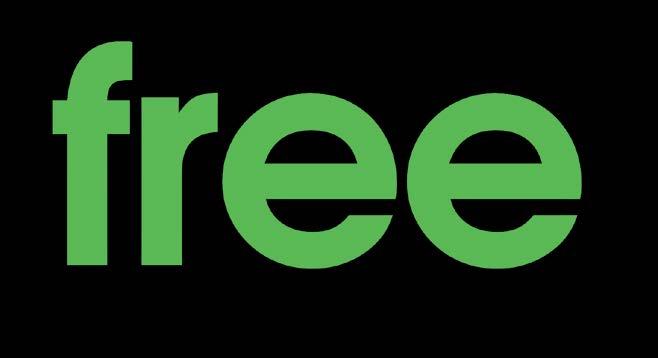
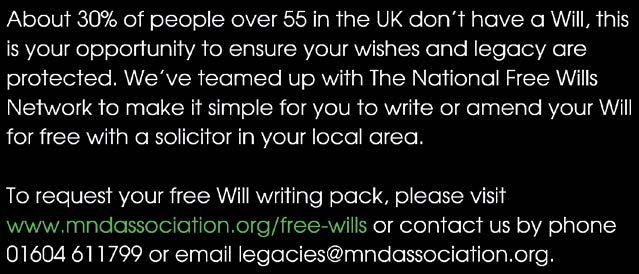
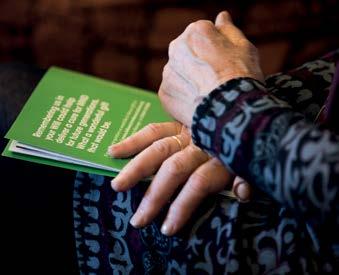
These gifts currently account for around 30% of the MND Association’s income allowing us to support many more people living with MND.


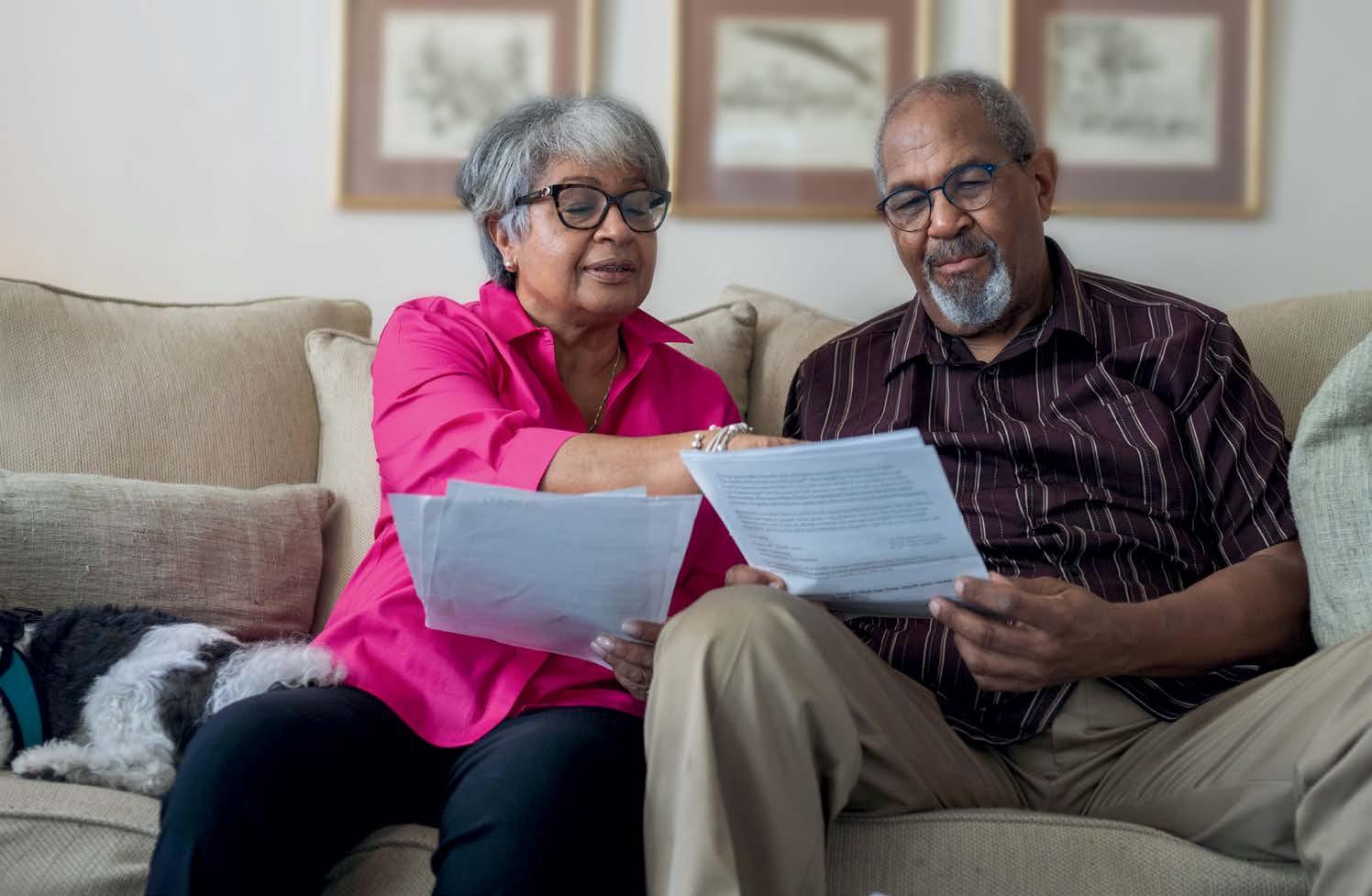
With a passion for social anthropology and a PhD in heath studies, Dr Eleanor Wilson is a leading MND researcher based at the University of Nottingham.
Previously both a speaker and poster presenter at the MND Association’s International Symposium on ALS/MND, her work centres around the use of ventilation, decision-making and end of life care in the home environment, focusing on the provision of care for those affected by neurological conditions, and the health care staff who provide the care.
Much of Dr Wilson’s work has been supported by the MND Association, including the TVLife Study, results of which were shared recently.
Tracheostomy ventiliation (TV) isn’t offered as standard practice because there isn’t a good evidence base for it. However, this study involved finding personal stories to share to help other people with MND understand what it’s like to live with TV. The team worked with people living with MND, their family members and health professionals to produce an online resource for people who are considering TV.
The MND Association is now supporting Dr Wilson’s next study, Complex Homecare in MND (CHiMND), which hopes to achieve improvements in the care provided at home to people with MND.
What did you want to be as a child? I wanted to join the police force!
How did you get into social science? I did criminology and sociology for my undergraduate degree, with an initial focus on the criminology side but I found I enjoyed the sociology, and particularly social anthropology, more. I then went on to do a Masters in medical social anthropology.
How did you come to study MND? I had the opportunity to work in palliative and end of life care in long-term neurological conditions, focusing for my PhD on people living with Huntington’s disease. Through this, I built a network of clinical contacts and also started to
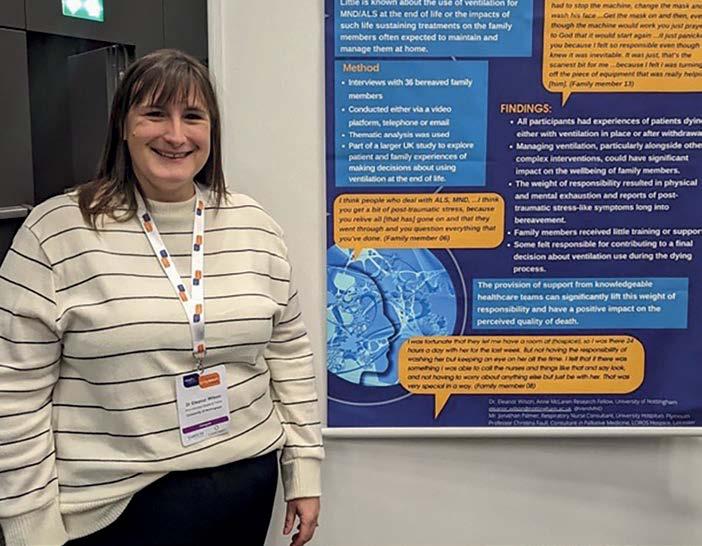
recognise how limited our knowledge is about MND. As a result, we worked together to identify some key areas to explore that could improve patient care and family support.
How could your past and current research be used to help people affected by MND?
Evidence from my two completed studies showed how vital good quality homecare support can be, yet we know little about the roles, training needs and relationships homecare workers have when supporting families affected by MND.
We hope the CHiMND study will help increase understanding of complex homecare and could lead to improvements in the training, recruitment and retention of homecare workers for people with MND.
It could also provide insights into how communication and the coordination of care among different healthcare professionals and services can be improved. Ultimately, better understanding of the roles and responsibilities of homecare workers could lead to higher quality care at home for people with MND, prevent unnecessary hospital admissions, and increase support for family carers.
What does a typical day look like for you?
One of the things I love about social science research is that there is rarely a typical day! I spend my time collecting data by talking to people with MND, their families and the health professionals involved in their care. I also write papers, book chapters, and short articles, and design posters and presentations for conferences. As well as teaching, and supervising Masters and PhD students, I support the early career researchers in my department. So a ‘typical day’ involves a lot of different things!
How do you unwind?
I have a family including two daughters at primary school and a cat we all adore! My kids keep me busy and I also enjoy doing some amateur photography, very amateur furniture painting and yoga to find peace!
Final word
In a nutshell, my work centres on the experiences and perspectives of those affected by MND and the people that are involved in their care, with the aim of contributing to real changes in our understanding of living with MND and the delivery of care.
Kennedy’s disease is caused by a changed gene and affects motor neurones in a similar way to motor neurone disease, causing similar symptoms. These can include muscle weakness and twitching, constant tiredness, swallowing difficulties and problems with speech and communication. These similarities can lead to confusion at diagnosis.
However, Kennedy’s disease varies in each individual and can cause other symptoms, such as hormonal problems.
One of our information reviewers said: “Until I was diagnosed, I had never heard of Kennedy’s disease and neither had my consultant, which shows how little information there has been available.”
To help, we have launched two new booklets, one to help people affected by Kennedy’s disease and another to guide professionals in their support.
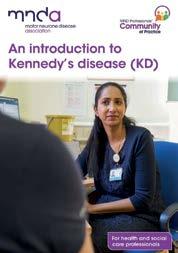
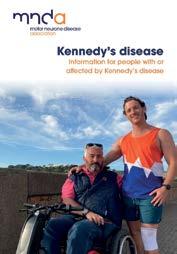
Our Kennedy’s disease guide for people living with the condition replaces the previous information sheet. It contains detailed information about the disease and likely symptoms. There’s guidance on support, services and relevant organisations. People with Kennedy’s disease have also shared tips on how they face their daily challenges, such as ‘listen to your body and perhaps do a task in two steps, rather than all at once. You achieve the task in the end, but without the frustration of tiredness.’
Our other new booklet, An introduction to Kennedy’s disease is designed to support health and social care professionals and covers key aspects of diagnosis, gene inheritance and symptom management, and highlights the range of support options available to those affected.
Lynne Hills, Specialist Wheelchair Therapist at QEF Mobility Services said: “I was given an opportunity to contribute to the introduction of the Kennedy’s disease booklet recently published. I hope that this will highlight the value in the role of a mobility and wheelchair specialist at the Kennedy’s Disease Clinic and outline the benefits it can afford this client group.”
The experts at the Kennedy’s Disease Clinic in London, helped during development of both booklets which they described as ‘clear, engaging and packed with useful information’. With their help, both booklets contain new photography taken at a recent photo shoot at the clinic.
Until I was diagnosed, I had never heard of Kennedy’s disease and neither had my consultant, which shows how little information there has been available.
Find more information about Kennedy’s disease on our website at: www. mndassociation.org/kennedys Find our full list of publications for professionals at www.mndassociation.org/propublications Order a printed copy of the booklets from our helpline MND Connect, 0808 802 6262 or email mndconnect@ mndassociation.org
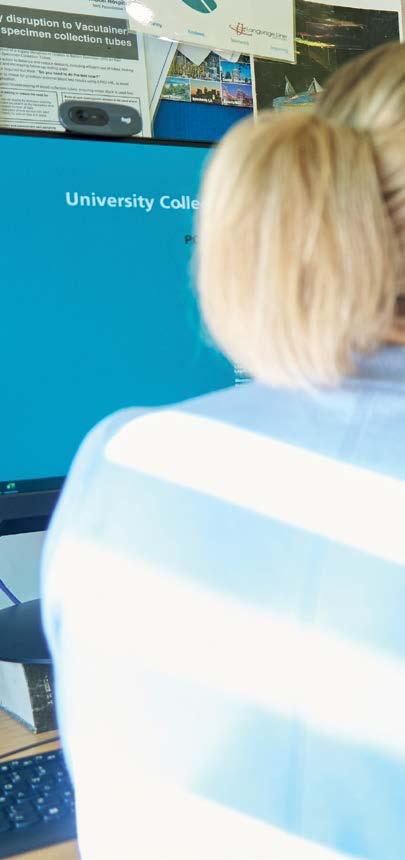
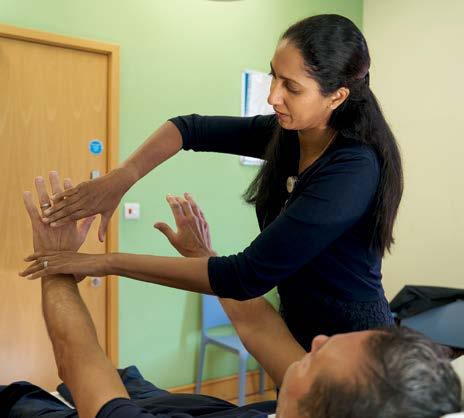
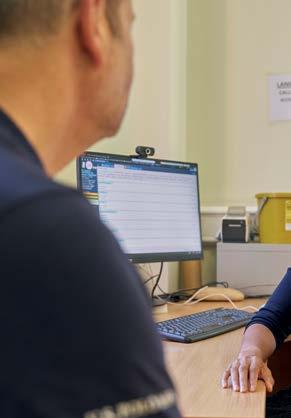
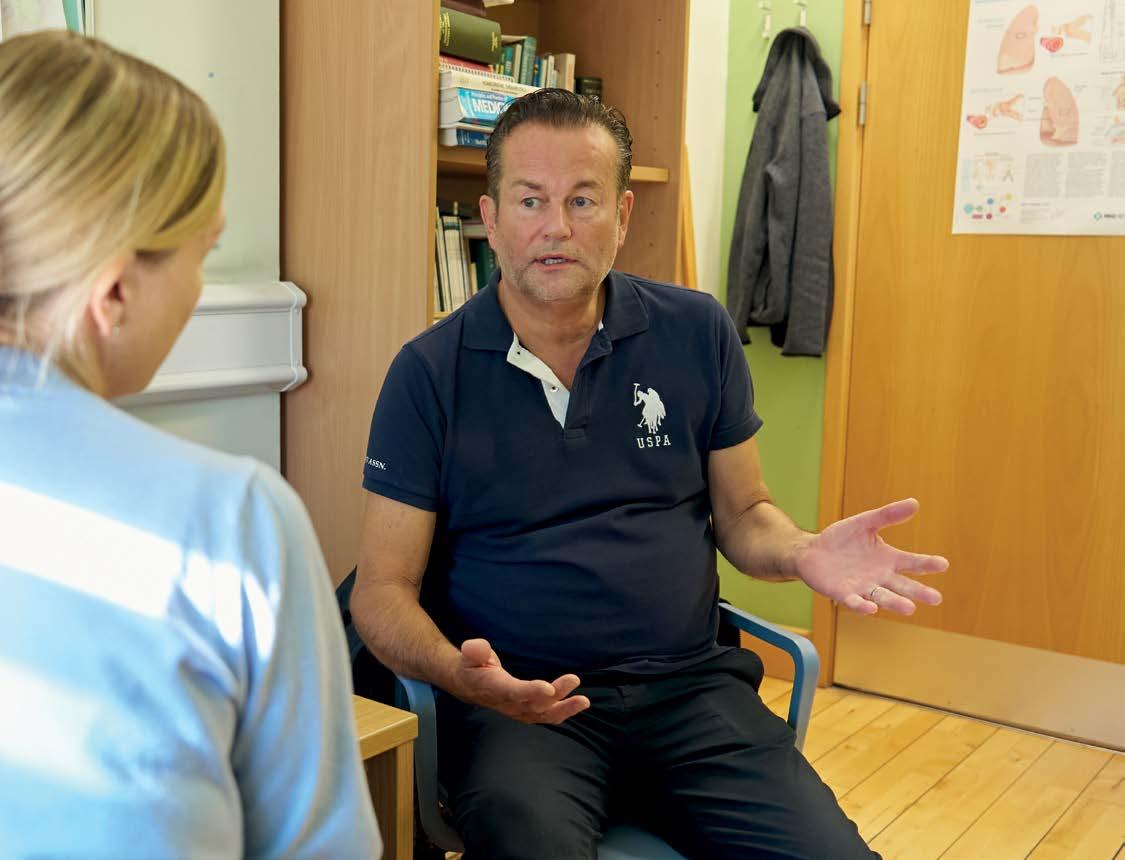
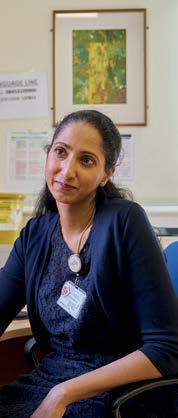
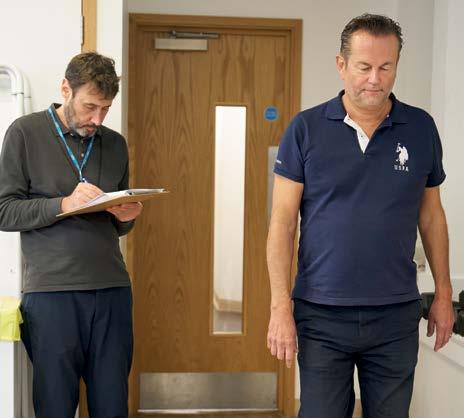
I was given an opportunity to contribute to the introduction of Kennedy’s disease booklet recently published. I hope that this will highlight the value in the role of a mobility and wheelchair specialist at the Kennedy’s Disease Clinic and outline the benefits it can afford this client group.
Therapist
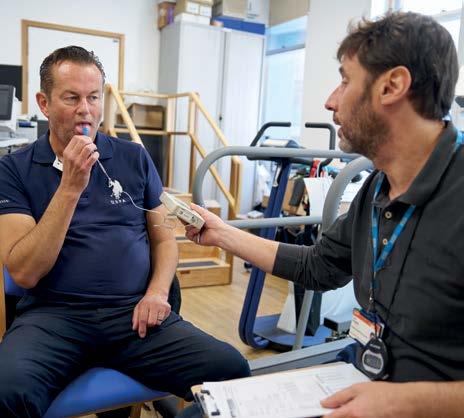
We turn the spotlight on some of the most promising and pioneering research being funded by the MND Association right now.
MND affects different people in different ways. In his Clinical Fellowship at the University of Oxford, Dr David Lester is studying proteins in people with MND to try to understand what is happening within the brain that may account for the differences in the way MND affects people. Using computer models the project aims to identify patterns that might be used to create subgroups of MND. Finding subgroups of the disease could potentially improve the chances of finding effective therapies in the future as potential treatments could target the underlying biology of MND in each subgroup.







Understanding the transfer of information and knowledge in a neurone in MND
There is a process for the transfer of information and nutrients from one end of our neurones to the other and back again. Evidence suggests that at the very beginning of MND this process goes wrong, but it’s still not clear what the problems are, or why this happens. Alya Masoud Abdelhafid, a PhD student at University College London, is looking to find out more about what happens to the transport of information and nutrients in MND. Furthering our understanding of this process could help researchers to find ways to correct or prevent these problems in MND, which may reduce damage to the motor neurones and slow disease progression.
Thank you to the Broad Appeal for supporting this research.
More than £31,000 was donated to the Association’s BBC Lifeline Appeal, which aired on BBC1 and BBC2 in October.
Fronted by our patron Charlotte Hawkins, the appeal featured James, Maggie and Eoin, who all described the invaluable support they’d received from the Association since being diagnosed with MND.
James said: “Participating in the BBC Lifeline Appeal was an experience that brought a whirlwind of emotions. As the camera crew set up their equipment, I could feel my heart racing, a mixture of excitement and nervousness. It was both surreal and humbling to share my journey with MND with such a wide audience. The funds generated





Some people with MND can experience changes in their thinking and behaviour that can affect their daily lives and their care. Psychologists can support people living with MND and their carers to manage these challenges. Dr Emily Mayberry, from the University of Sheffield, is investigating the current support available by looking at what is important, how this care is being delivered now, what is working well and what can be improved. Her research could provide recommendations about how best to run MND psychology services to improve care in the future and ensure people with MND and their carers get the right support.
Thank you to the Grace Trust for supporting this research.

The connections between neurones are vital in sending messages from one neurone to another and then to the muscles. In the early stages of MND these connection points can become damaged, meaning that connections are lost and this might lead to the death of the motor neurone. Professor Gareth Miles at the University of St Andrews is exploring why and how these connection points become damaged in the disease. Once it is understood why and how these connections are lost, researchers can investigate ways to prevent this damage and reduce motor neurone death.
Find out about more of the research projects we’re funding on our website: www.mndassociation.org/ research/our-research/research-we-fund
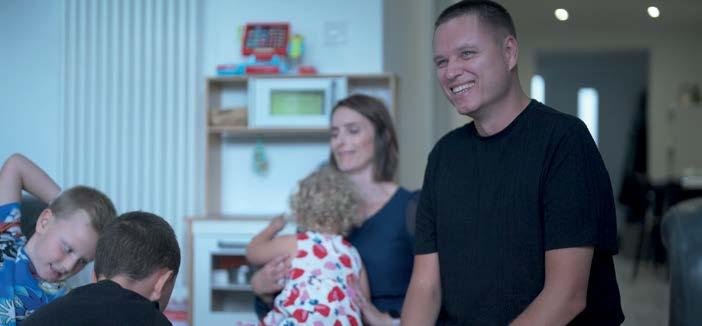
through appeals like this one are vital for supporting research initiatives that may one day lead to effective treatments or a cure.”
Watch our Lifeline Appeal on our website: www.mndassociation.org/ about-us/who-we-are/raising-awareness/ bbc-lifeline-appeal
‘I’ll be right there with him’
Personal trainer Mike Humphreys has vowed to ‘carry on fighting’ for his friend who is living with motor neurone disease, after completing 30 marathons in 30 countries in 30 days.
Mike, from Hedon, near Hull, is already planning more fundraising events after raising more than £29,000 from the superhuman challenge which saw him run in 30 cities across Europe. The money raised from the challenge will be split between a fund set up for Craig and his family, and the MND Association.
Despite having to overcome serious mental and physical challenges, as well as bureaucracy and red tape, Mike said he was ‘absolutely determined’ to complete the challenge in memory of his friend Carl Giblin who died from MND in 2017, and inspired by friend Craig Eskrett, who is living with the disease after being diagnosed aged just 36.
He said: “I was determined to overcome every obstacle which was thrown at me –and there were a lot!
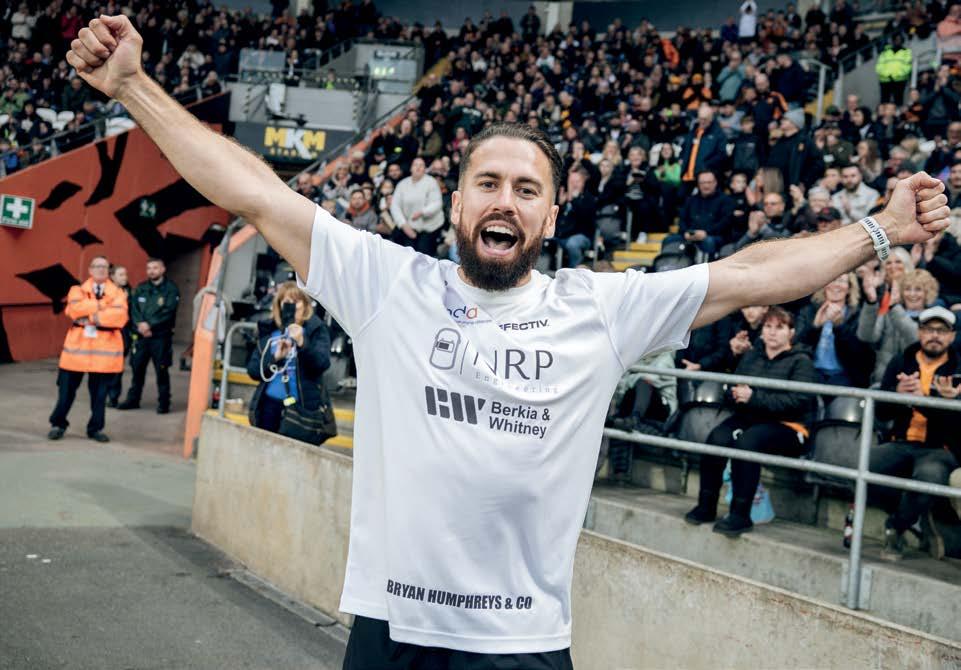
reach the next destination, after running his daily marathon.
At the darkest times I knew Carl was looking down on me and urging me to carry on and that gave me the strength I needed to push through.”
“I set off not knowing whether I could complete it. I’m in good shape, but I hadn’t trained and I honestly didn’t know if I would be able to do it. But I had to do something different, something which really stood out and captured people’s imaginations because I wanted to raise as much awareness as possible and draw attention to this terrible disease.
“By the time we reached San Marino on day five or six I began to doubt myself. I was running a marathon in hills and my legs were broken, I was extremely tired and was running at night. At the end of that particular run, someone stopped me to make sure I was OK as they thought I had been attacked or was injured!”
The lack of a support crew also meant Mike faced drives of up to six hours to
He said: “I did start the journey with a driver but they dropped out and another couldn’t get the right insurance, so I was doing a lot of the driving on my own. My family were really worried about me and my Mum and Dad even told me to cancel the whole challenge at one point.
“In the end, my brother Gareth helped me to change the route so the distances in between each location were shorter but the lack of sleep was extremely difficult.”
Mike also encountered difficulties at the borders of some countries, with Montenegro and Albania initially refusing him entry.
He said: “There were issues over documents at the borders which caused us real problems as the delays meant I was hours behind completing the marathon. Few of them spoke English so it was a huge relief when they finally let us through and we were able to continue on our way.
“At the darkest times I knew Carl was looking down on me and urging me to carry on and that gave me the strength I
needed to push through.”
Mike finally arrived home in Hull on 2 November for his final marathon, which saw him receive a hero’s welcome at the city’s MKM Stadium.
He said: “It was overwhelming to be honest. I’d only had three hours sleep the night before and to see so many people come out to run with me was just incredible, I can hardly put it into words.
“The effect on my body has been immense. I think I’ve lost about 5kg of muscle mass – I’m a weightlifter and that amount of muscle can take years to build back up.
“For the time being at least, I’m taking it easy and resting as much as possible, although I do need to start running again soon to help my recovery. It’s been great being back home and enjoying some proper food!
“My brother has joked that he’s taking away the keys to my van to stop me doing anything else, but I’ll definitely be back.
“As long as Craig is fighting MND, I’ll be fighting right there with him.”
To donate to Mike’s appeal visit www. gofundme.com and search for Craig Eskrett.
Betting and gaming company Evoke Plc, has raised more than £117,000 for the MND Association at a charity gala which was inspired by a former employee.
More than 450 people attended the event at the Royal Armouries Museum in Leeds to show their support for Tamara and others who are living with the disease.
Tamara, a talented horserider, was diagnosed with MND in 2016, aged just 26.
Prior to her diagnosis Tamara was full of life and optimism for her future. “Nothing would stop her,” her mum Tracy remembers. “If it was doable, she’d do it.” She began experiencing symptoms like dropping things and nerve pain, but the diagnosis of MND was a complete shock to Tamara and her family.
Tamara said: “I never expected to walk out of that appointment with a terminal diagnosis of MND. I was only 26 years old. I was in shock. How are you supposed to process that?”
Despite the diagnosis, Tamara was determined to continue to do what she loved. With funding from the MND Association, Tamara was able to continue to ride with a custom-made saddle.
Tracy said: “It had removable blocks so that we could move them forward, backwards, upwards, or down. We could also put bigger blocks in to support Tamara’s legs.
“It had extra D-rings on the front, and
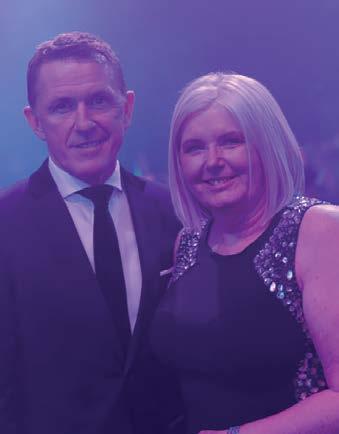
WE WON’T REST UNTIL EVERYONE GETS THE CARE THEY NEED WHEN THEY NEED IT
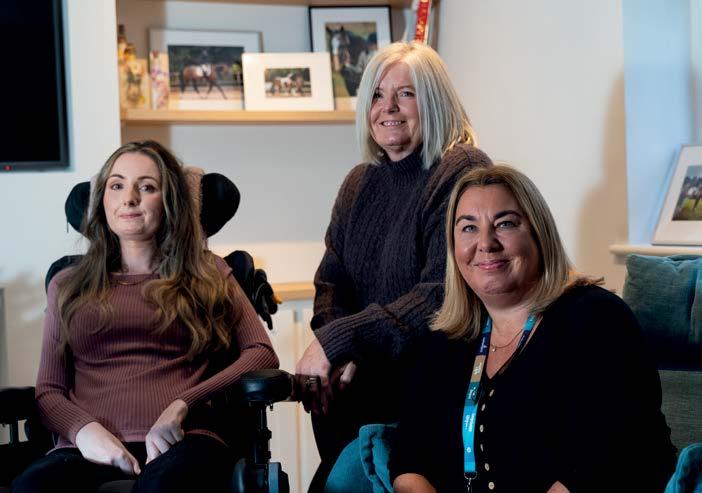
the leather was non-slip, which helped to maintain Tamara’s position in the saddle and stop her sliding about and enabled her to ride a bit longer.”
This practical support made a world of difference, both physically and emotionally. But eventually, riding became impossible.
Tracy said: “That’s been the hardest thing. She wanted me to compete on her pony, and I still do, but feel guilty.”
Inspired by Tamara’s spirit, her family, friends and colleagues are supporting the fight against MND. Betting and

gaming company, Evoke plc, the operator of brands including William Hill where Tamara used to work, 888 and Mr Green, raised £117,000 for the MND Association through its inaugural ‘Evoke the Stars’ charity gala.
I never expected to walk out of that appointment with a terminal diagnosis of MND. I was only 26 years old. I was in shock. How are you supposed to process that?
Tamara’s aunt Leisa Byers, Regional Operations Manager at Evoke, alongside Tracy and Tamara worked with the Association on a film that was shown during the gala, telling Tamara’s story and the impact MND has had on her and her family.
Per Widerström, Evoke CEO, said: “Through our charity gala – a fantastic occasion that brought together our colleagues, partners and ambassadors –we wanted to play our part in raising vital funds for this charity while showcasing our commitment to support the causes that matter to our colleagues and the broader community.”
Recruitment for the first nurse in the MND Association Research Nurse Network is now underway.
The five year, £5 million investment will build a unique co-ordinated network of MND Association research nurses. The initial post is expected to be filled by the end of March.
The specialist nurses will help people with MND navigate the research trial process – providing information, identifying trials and research opportunities patients are eligible for, explaining what’s required, and supporting their ongoing involvement.
Sally Hughes, our Director of Services and Partnerships, said: “We know people with MND often spend hours researching and applying to take part in trials, only to be given the frustrating news that they aren’t eligible.
“MND Association research nurses will do that for them, providing all the guidance and support each person needs
to make what is a really personal choice, and then guiding them through the process.”
Currently, access to trials depends on several factors including a person’s proactivity in seeking opportunities, the knowledge their health and social care team has of research trials and where they live.
The MND Association Research Nurse Network aims to bring equitable access, with the opportunity to take part in clinical research and trials part of each person’s holistic care.
Dr Brian Dickie MBE, Chief Scientist at the MND Association, added: “We want to create an environment where everyone diagnosed with the disease has options.
“By establishing the MND Association Research Nurse Network we believe more people will be recruited into trials, more quickly and that can only help speed up the pace of research towards potential treatments and ultimately a cure for MND.”
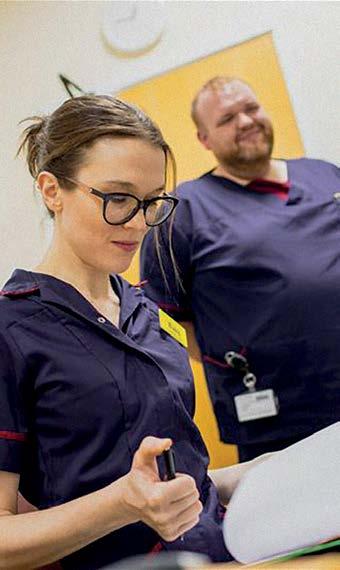
A new digital monitoring platform has been launched to support people with MND in the UK to take part in studies from the comfort of their own homes.
Telehealth in MND-Researcher (TiM-R) is a new digital platform which is aimed at speeding up the process of research studies and widening access to research for people with MND.
Launched by researchers from the University of Sheffield and the UK MND Research Institute (UKMNDRI), TiM-R brings all the UK’s MND research studies into one place. The platform is hosted on MyPathway, which is funded by the MND Association along with LifeArc, My Name’5 Doddie Foundation and the National Institute for Health and Care Research (NIHR).
The technology allow researchers to engage with participants remotely, reducing the cost and length of time of
studies. It will also improve access to data.
Dr Liam Knox, Research Fellow and member of the Sheffield Institute for Translational Neuroscience (SITraN) at the University of Sheffield said: “By simplifying the research process and building a strong patient community, we hope to accelerate significant advancements in MND research.
“The technology also highlights opportunities for collaborative clinical trials and could help pharmaceutical companies reach people with MND directly. We hope this two-way process will help to speed up finding a cure.”
The platform allows participants to self-refer to multiple studies at once and provide data remotely, giving more people the opportunity to participate in a broad range of MND research studies.
Jennie Starkey, from Bedfordshire, is living with MND and has used the new platform. She said: “I think this will be an
excellent inclusion tool for people who have limited mobility and have problems travelling to MND centres to get involved with the fantastic research happening across the UK. I am excited to see how this will give me the opportunity to contribute to important research.”
MND researchers can find and engage with potential participants via the platform which also provides access to standardised data within a secure database.
Professor Chris McDermott, Professor of Translational Neurology at SITraN and CoDirector of the UK MND Research Institute said: “Our new MND research platform has been co-designed with people living with MND, MND researchers and members of the pharmaceutical industry. As a result, we have a platform that meets the needs of all stakeholders who want to find better treatments for MND as soon as possible.”
People living with MND and their families have done extraordinary things in 2024 to raise funds and awareness of the Association’s work.
Mark O’Brien
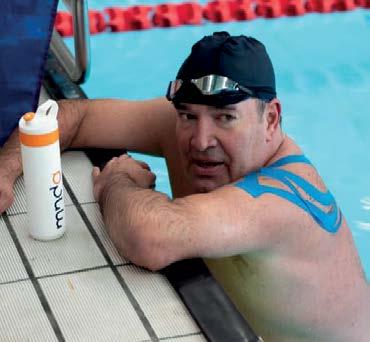
In September, Mark O’Brien, who was diagnosed with MND in March 2022, broke his second world record in just over a year. He said: “After completing my first world record in 2023 for the furthest distance swum in open water unaided, and non-stop by a person with MND, it took a while to recover.
“Physically I can’t do the longer distances anymore, so I wanted to try and achieve the fastest. I did the 50-metre freestyle record in London and then flew to Dublin to break the 100-metre freestyle Guinness World Record.
“Although my time on this planet may be shorter than most, I will fight until my very last breath.”
Scott
David Scott was joined by a team of 56 friends, family and supporters when they climbed all three Yorkshire peaks in one day to support the Association and other charities. The team covered 24 miles with an ascent of 5,000 feet, raising more than £13,000.
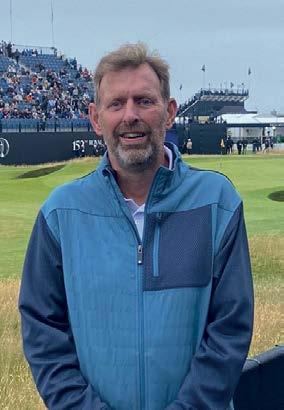
David said: “The support from family and friends was amazing.
“The team ranged in age from 17 to 61 and everyone bonded. It was the hardest thing we’ve done but everyone is asking when the next challenge will be!”
Liam Blaney was diagnosed with MND just before Christmas 2021 and has used a wheelchair ever since.
Having been pushed up Mount Snowdon in 2022 and taken part in a skydive, this year he completed a wheelchair marathon at the Derby Velodrome.
Liam, a lifelong Derby County supporter, said: “The last time I remember standing up was at Pride Park cheering Derby on, so I tagged an extra mile to the marathon to complete a lap of the stadium.”
Liam completed 170 laps, raising over £2,000.
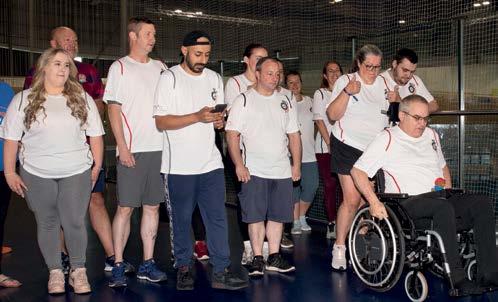
In the ten years since Cath Muir was diagnosed with MND she has embarked on a range of fundraising challenges.
This year has been no exception, with Cath and her sister Ruth completing their 1234MND challenge at the end of June raising £7,185. Ruth also completed the National 3 Peaks cycling in between each peak before pushing Cath up Mount Snowdon.
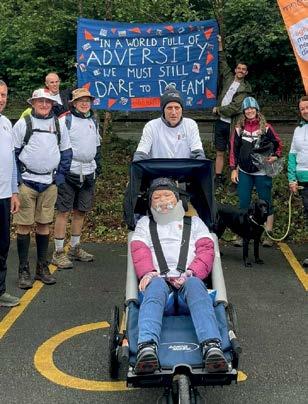
Ruth said: “Getting Cath to the top of Snowdon was a lot harder than expected. It was wet, rocky and steep but Cath and her husband Ian did brilliantly, I’m so proud of them.”
Dairy farmers in Cumbria are urging farmers across the country to join their ‘Milk for Messy’ campaign to raise money and awareness for the MND Association.
‘Milk for Messy’ was created in honour of Cumbrian dairy farmer Richard Messenger, who was diagnosed with MND. The campaign has so far raised over £30,000 through various activities, including a Lands End to John O’Groats challenge
with local young farmers.
To support the fundraising campaign, Richard Martin, who farms at Orton Grange Farm in Cumbria, donates 10p from every bottle of milk distributed from their vending machine to the MND Association.
Richard said: “The idea came about speaking to other dairy farmers who wanted to show support to the Messenger family and also raise funds for
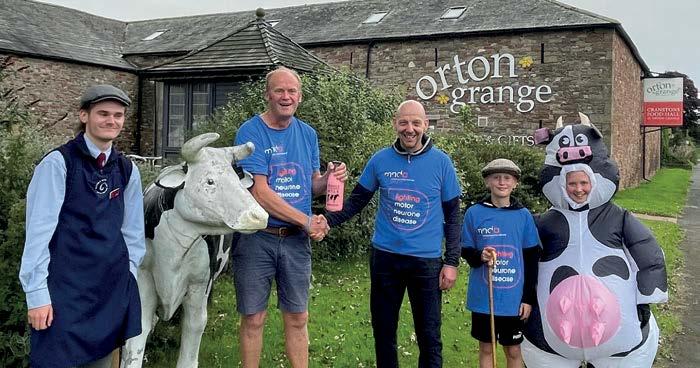
the MND Association. Our good friend Paul Swainson (also a dairy farmer) came up with the idea and we hope it will inspire many farmers and non-farmers to join us.”
The campaign has gained widespread support throughout the north Cumbrian farming community and now the farmers hope other dairy farmers across the country will get on board.
Richard Messenger and his wife Elisabeth are touched by the support they’ve received from the farming community. Elisabeth said: “It’s a wonderful effort. And this is a wonderful group of friends and supporters. They all have such big hearts.”
You can donate to the campaign via the Just Giving link below www.justgiving. com/page/milkfor-messy
Or scan the QR code
The Barrow family recently made unforgettable memories on a dream trip to Norway. Anna Barrow, who was diagnosed with MND in 2023, her husband Martyn, and their three daughters – Tilly, Eve, and Fallon – joined a cruise in Norway to see the breathtaking northern lights. The trip, which also celebrated Anna’s 40th birthday, was a once-in-a-lifetime experience made possible in part thanks to MND Association support grants.
Anna, whose lifelong dream to witness the northern lights, said: “The holiday was fabulous, and what a way to spend my 40th birthday with Martyn and the girls... and the northern lights! I’m so grateful to the MND Association for providing grants for me and the girls to help towards the holiday. As a family, we are extremely thankful for their generosity and support.”
The family enjoyed every moment of their time together, from stunning views to heartwarming moments to cherish. Anna’s daughters summed it up perfectly: “Thank you, MND Association, for everything you do to help families like ours create special memories that we will hold in our hearts forever.”
For Martyn, it was an emotional trip filled with joy and gratitude. “What a holiday – fun, food, once-in-a-lifetime

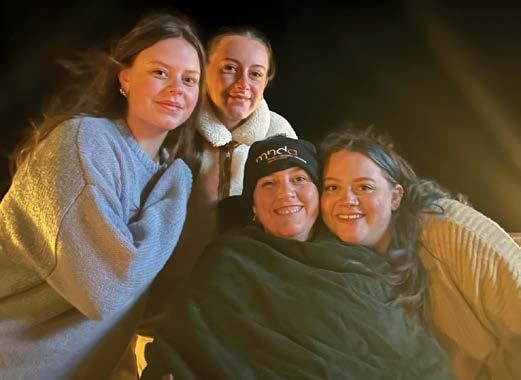
moments, and plenty of laughter and happy tears,” he said. “Thank you to the Association for helping facilitate this for Anna and my family.”
Over 730 people from around the world, including Australia, New Zealand and India, joined us online in November for the 2024 Stephen Hawking MND Lecture: Motor neurone disease – the importance of psychological care.
People living with MND, as well as their carers and loved ones, face uncertainty, continuous losses and tough decisions. For this reason, it’s essential people living with and affected by MND receive the right support for their psychological wellbeing.
Thank you for explaining Acceptance and Commitment Therapy so well and how it can help those with MND and the professionals who support them.
This year’s lecture focused on the emotional challenges people with MND experience, the impact these have on mental health and the professional guidelines for psychological support in MND. Our host, Professor Rebecca Gould, from the University College London’s

In the last 12 months, 1,480 health and social care professionals have attended MND Association events to learn, build knowledge and network to improve care for people living with MND.
Eight webinars covered topics including anticipatory grief, the MiND-B Toolkit, and the Whole Family Approach. One attendee described these sessions as ‘very relevant to clinical practice, offering practical tips and ideas’.
We held four Listen, Lunch and Network events, exclusively for Care Centre Co-ordinators, which combined learning and brainstorming opportunities, and four Community of Practice Information and Knowledge Exchanges, focused on key issues such as managing saliva and navigating complexity. We also supported four Care Centre Study Days and four practical
Division of Psychiatry, highlighted how a lack of research can prevent health and social care professionals from providing effective, evidence-based care.
Professor Gould shared the findings from the COMMEND study, which she recently co-led. This pioneering clinical trial, co-funded by the MND Association, is the largest trial to date on the effectiveness of psychological support for people with MND. It particularly looked at the impact of delivering Acceptance and Commitment therapy (ACT), a form of psychological therapy that has shown promising results on improving quality of life.
ACT combines behavioural and motivational strategies to help people handle distressing thoughts and challenges, such as managing an MND diagnosis. During the lecture, Professor Gould explained how the principles of ACT can be used by health and social care professionals to support people with MND to discuss their feelings, find their goals and value the activities and relationships that are important to them.
Visit www.mndassociation.org/ HawkingLecture to watch the recording of the 2024 Stephen Hawking Lecture, as well as previous lectures.
workshops. These workshops addressed topics such as posture management and respiratory failure.
The Care Centre and Network Day in Leicester in June brought together professionals from MND Associationsupported services to foster service development and collaboration.
Our new Competency sessions focused on genetics and MND, supporting professionals to discuss this topic with people with MND and their families with more confidence.
Our diverse education programme provided practical insights and fostered collaboration across the MND care community. Through webinars, workshops, and study days, these events reflect the MND Association’s commitment to supporting professionals and improving the lives of people with MND.
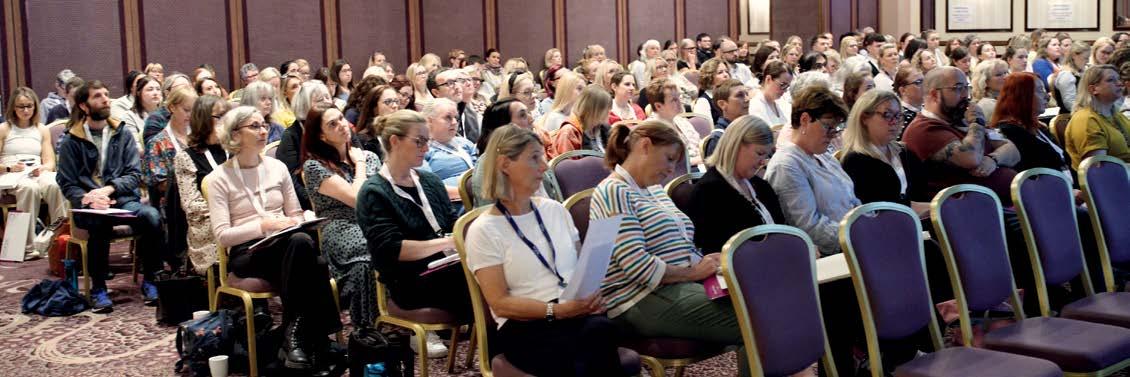
On 9 October, the Association hosted the third annual MND Professionals’ Community of Practice Networking Event. Over 160 health and social care professionals gathered to explore innovative ways to enhance the quality of life for people living with MND.
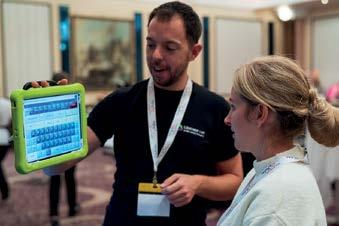
The theme, What Matters Most?, emphasised person-centred care. The day began with a keynote speech by Professor Eneida Mioshi, who examined behavioural symptoms in MND, their impact on families, and practical strategies for professionals. A follow-up knowledge session by Dr Caroline Barry explored the Mental Capacity Act, helping professionals navigate best-interest decisions for
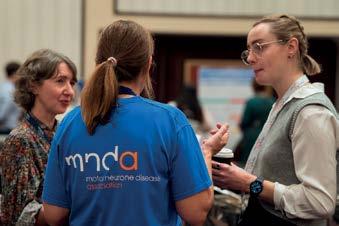
individuals affected by cognitive changes or frontotemporal dementia.
Interactive sessions addressed critical aspects of MND care, including strategies for preserving individuality, navigating nutrition and respiratory challenges, and supporting families and carers in maintaining balanced relationships.
It
was amazing to meet so many like-minded clinicians who share the same values when caring for MND patients.
Practical workshops introduced bespoke equipment and technologies alongside creative approaches to advance care planning and managing behavioural changes.
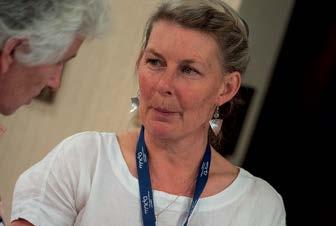
One participant said: “It was amazing to meet so many like-minded clinicians who share the same values when caring for MND patients.” Another shared, “Absolutely love coming to this event, great to network, sharing knowledge and best practice.”
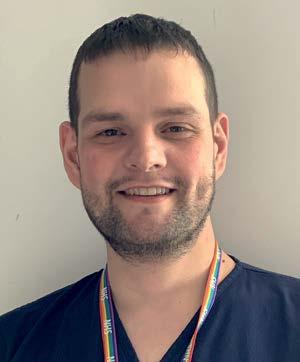
“The MND expert core brings together team members from different professions who have vast knowledge, skill and experience. We all work day-to-day with people affected by MND and use the expert core forum to identify good practice. We use this feedback and our professional experiences to influence change in practice by developing and updating information, resources, education and research.
“We work throughout the year on various projects, which culminate in the annual MND professionals’ Community of Practice Networking Event. This gives an opportunity for professionals to meet, share resources and get hands-on experience. It’s a great opportunity to upskill and learn from each other, taking this new knowledge back to the local MND community, which then enhances the care and support offered to people affected by MND in those areas.”
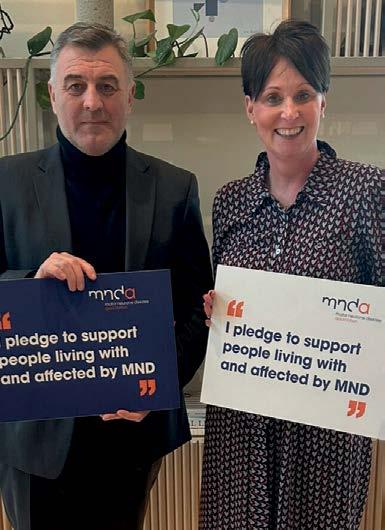
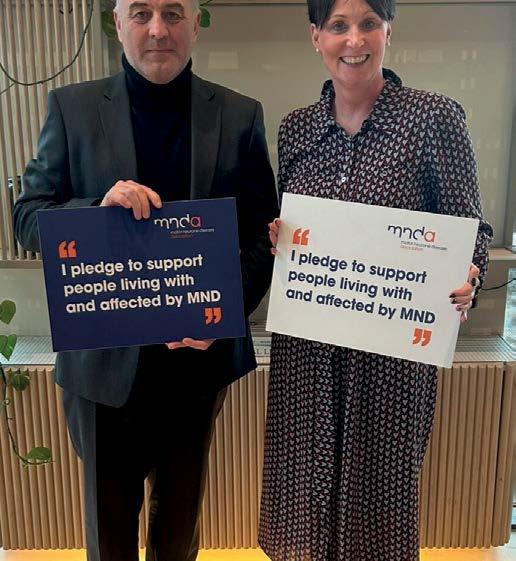
The All-Party Parliamentary Group on MND has re-established following the general election. It held its first meeting in November where Ian Byrne, Member of Parliament for Liverpool West Derby was elected Chair of the group.
Ian first came across MND over 14 years ago when his friend, popular amateur footballer Mark Maddox, was diagnosed with the disease. During his 11 years living with MND, Mark did a huge amount to raise money and awareness becoming the first person with MND to complete the London Marathon, do a parachute jump and record an album.
Talking about his friend, Ian said: “Mark had quite a transformational effect on me. His was a long 11 year journey with MND, and during that time I got to know his family. Mark’s wife Jayne was hugely positive about me standing as Chair, as were Mark’s family and friends. They have been big supporters of MND through Mark’s journey and I felt I could reflect their views and the experiences we shared.”
With a background in community activism and trade unionism, Ian is keen to ensure the voices of everyone affected by MND are heard in Parliament. One of the
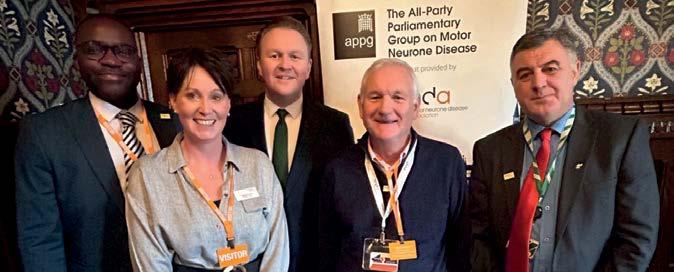
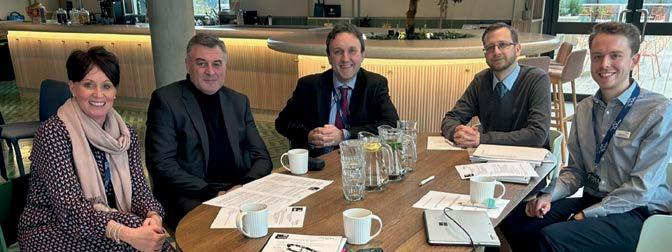
first actions the APPG on MND has taken is to conduct a survey of people affected by MND to inform and shape the APPG’s programme over the next parliament. The cross-party group of MPs are calling on people affected by MND to share their views on the issues that affect them, to ensure they focus their attention on what matters most to the MND community.
Many
MPs will have constituents living with MND and will likely know of them because they’ve reached out to their MP for help and guidance.
During the meeting MPs heard from Nick Smith, who is living with MND. Nick said: “I answered their questions about the impact of MND on my life and shared with them issues around the winter fuel payments, the benefit application process and the postcode lottery of claiming Disabled Facilities Grants. I felt a deep responsibility towards everyone who is living with MND who want to be heard. I
just hope I did them justice.”
Ian said: “Hearing from the community really highlights the real-life impact of living with MND, including the financial hardship that comes with it. The cost-ofliving crisis, the winter fuel payment and the unbelievable expense that’s incurred when you’re suffering with this terrible, cruel disease. It’s something that as a society and as a Government we need to look at.
“Our job as the APPG on MND is to listen and act on what people want and try to make their lives easier. Many MPs will have constituents living with MND and will likely know of them because they’ve reached out to their MP for help and guidance. There is a big awareness of MND in parliament and I think that’s reflected by who you’ve got on the membership list for the APPG. There are some really high-profile names on there. Now we need to use our position and influence to drive forward positive change for people living with MND.”
To complete the survey to help inform the activities of the APPG on MND over the next parliament please scan the code.

Living alone with a diagnosis of MND or Kennedy’s disease can bring its own day to day challenges, as well as concerns about future support and care.
After listening to people from the MND community in just that position, we wanted to help.
We worked with people living alone, our User Review Group and experts to create our new booklet Living alone with motor neurone disease or Kennedy’s disease, which explores the emotional and practical challenges people living alone may face.
We received invaluable support from a national project on living alone with neurodegenerative disease and dementia, through the NIHR Policy Research Unit in Dementia and Neurodegeneration (DeNPRU Exeter).
Sue Vale has MND. She said, “It’s crossed my mind that many others with MND or Kennedy’s disease may be ‘flying solo’, like myself. It didn’t seem to be addressed, but this booklet will support people like me.”
It’s crossed my mind that many others with MND or Kennedy’s disease may be ‘flying solo’, like myself. It didn’t seem to be addressed, but this booklet will support people like me.
Sue finds humour helps, as she explains: “Recently, I managed the step into a cafe without taking a tumble. I was so pleased with myself I promptly tripped and fell flat on my face inside. As I hit the floor, everyone turned to stare, so I popped my head up and said as loudly as I could ‘I’ve arrived!’ They all roared with laughter and helped me. Helping others relax can help you cope.”
Early responses to the new booklet have been positive. A reader said, “People living alone might be fiercely independent and not know how to ask for help… Pointing people to advice in a safe environment is key to their future quality of life.”
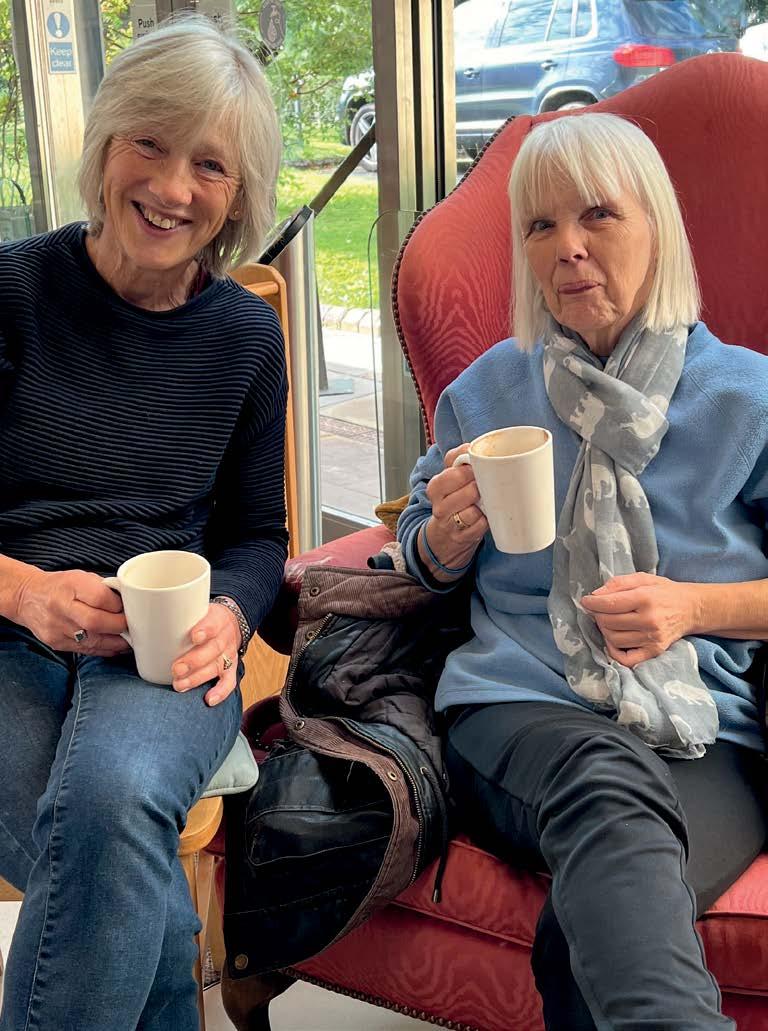
Another told us, “I do not live alone, but even with support, I’ll find this a very useful reference document. Thank you.”
Search for our resources with our Care information finder at: www.mndassociation.org/ careinfofinder or order printed copies of resources from our MND Connect helpline: 0808 802 6262 mndconnect@mndassociation.org
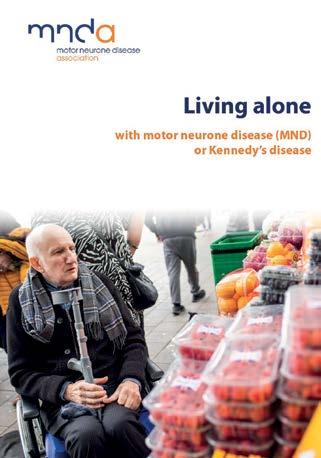
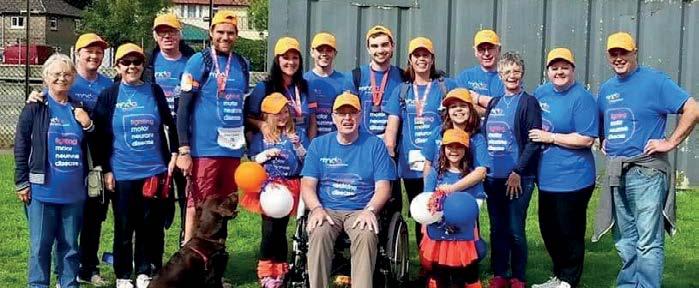
“Dad has always inspired people, even before his illness.”
Eric Frank was diagnosed with motor neurone disease on 13 July 2015.
“He lost most of his abilities very quickly after diagnosis. People always gasp when they ask how long it has been since Dad’s diagnosis,” shared his daughter, Micaela.
Like many families affected by MND, Micaela described feeling ‘an incredible sense of uselessness’. But she and Eric wanted to raise vital funds and awareness
for the disease so started their very own Fightback Fund. These unique and personalised pages allow people affected by MND to fight back alongside their loved ones, chronicling their fundraising events, milestones and memories in one place.
The Frank family have amassed £24,000 in Eric’s name.
“He is so proud of our friends and family who have contributed, and I believe he feels like he still has a purpose despite everything,” said Micaela. “This isn’t a route
The Mott MacDonald team is rallying together in honour of their friend and colleague Gemma Middleton, raising funds and awareness for the Association.
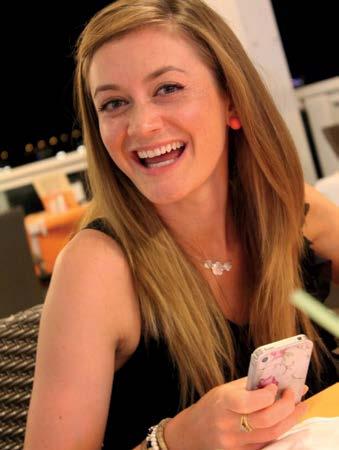
Gemma, an environmental consultant and a much-loved member of staff, died on 9 April 2023 from MND seven years after her diagnosis at the age of just 29. Gemma’s impact extended far beyond her professional contributions. Known for her smile, passion for her work, and unwavering dedication to her colleagues, Gemma embodied the spirit of Mott MacDonald.
In her memory, Amy Cox, Rhys Lennon, and Jake Tomlinson embarked on an ambitious challenge: the Lake District
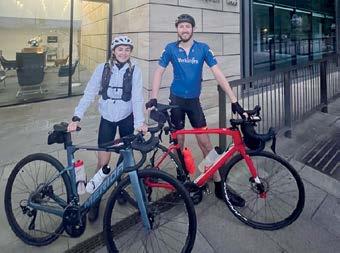
you expect but you become part of a community that really is one big family. Keep a smile on your face, take each day as it comes and remember to take care of yourself too.”
Learn more about how a Fightback Fund can work for you: mndassoc.org/ fightbackfunds
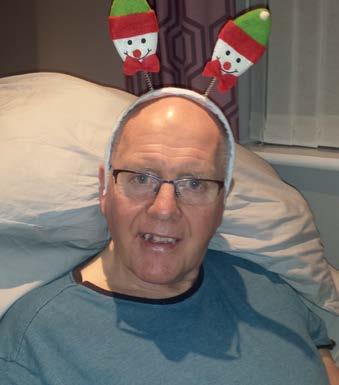
Ultra 100km raising over £4,500. This demanding trek covered 100km of rugged terrain, all in 24 hours. And the team’s not stopping there. Staff across Mott MacDonald are hosting a variety of fundraising activities, including circuit training classes, tag rugby matches, and more, ensuring the momentum continues.
The annual Mott MacDonald Sports Day 5k race has been renamed in avid runner Gemma’s honour, ensuring her legacy continues within the company and beyond.

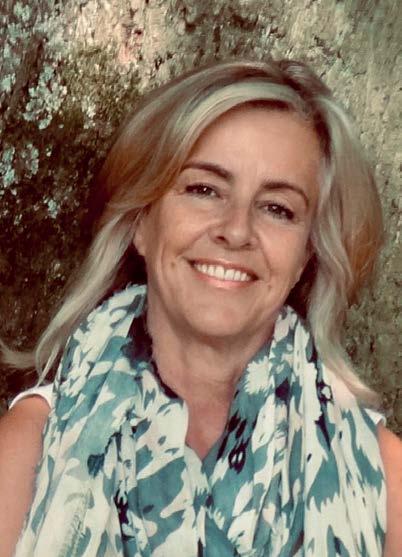
When the rapid onset of progressive bulbar palsy took away the voice of artist and sculptor Julie Harris-Hart, she turned to her art to convey her thoughts and feelings of living with bulbar MND.
Julie’s son Jonathan said: “Despite her world being turned upside down with the diagnosis, Mum was determined to live positively. But for Mum losing her voice was very hard, it was such a big part of her identity. She channelled her experiences into creating powerful and profound pieces of art. Through her art she was able to show her struggle and despair, the impact of being locked in, but it was also clear that she still saw beauty in life.”
Julie wanted to use her art to help raise awareness of MND and decided to hold an exhibition where she could sell pieces to raise money for the MND Association. Sadly Julie died before she could make it happen, but her son Jonathan is continuing what Julie started, in her memory.
Jonathan said: “I’m looking at venues to hold the exhibition, but there are some sculptures we will not sell. These are the pieces she did after she lost her voice. They are so profound and provide a glimpse into the impact of bulbar MND. Our aim is to lend these pieces to be shown in a variety of places to raise awareness of MND. Right up to the end Mum told her story in a way that was very unique to her using her gift. My job now is to share that gift with others.”
In her own words…

This piece represents the ‘locked in’ issue when you lose the ability to speak. There is an open lock but no sign of a key. It is when you go from verbal to non-verbal within a short space of time and you lose your sense of self which is pretty scary. Like dementia, MND robs you of everything. Trouble is you are aware of everything that is going on.

This is the first head I made. I was feeling quite desolate but curious by the physiology of it all. I felt compelled to embellish the ‘broken’ part of me, muscles in the face, mouth, throat, larynx. I wanted to depict beauty in my imperfection.
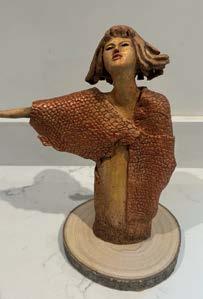
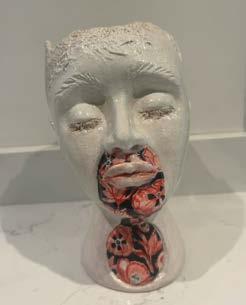
This sculpted head represents ‘the missing piece’ which is in the face, the bulbar region, i.e. throat, tongue, lips, salivary glands, voice box and mouth. Our means of communication and taking in sustenance to keep us alive. The core of the essence of our being.
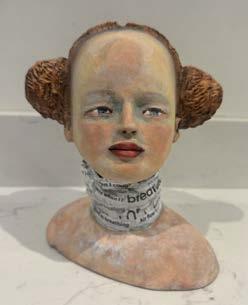
This sculpture represents how it feels when choking or gasping for breath. You have to force yourself to keep calm in order to breath at all, and any natural feelings of panic need to be banished. Your airways always feel compromised by thick secretions, choking and the inability to cough.
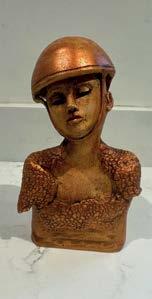
These two figures represent the highs and lows of the first weeks of my diagnosis. It is about my personal journey but will resonate with many people fighting their own battles. The small one has her hard helmet on ready for a day of ambush. Multiple issues are thrown at you while still processing the horrendous diagnosis, it is completely and utterly overwhelming. The majestic figure is brave and valiant, facing the day head on with the strength to cope with whatever is thrown at her.
A team of legal experts left the familiarity of London for the Lake District to complete the 24 Peaks Challenge.
They tackled a gruelling 50km trek through the beautiful Lake District countryside, scaling peaks like Scafell Pike and Helvellyn over two days.
The team from law firm Simons Muirhead Burton (SMB) wanted to take on a big challenge to raise money for the MND Association as its Charity of the Year for 2024. So far the partnership has raised more than £25,000.
John Harrington, Senior Associate and Chair of SMB’s CSR Committee said:
“Although it was a delight to get out of London into the mountains for the weekend, the challenge was incredibly difficult. The team were however amazing and we are delighted to have raised so much money for the MND Association. It makes it worth all the sore bodies!”
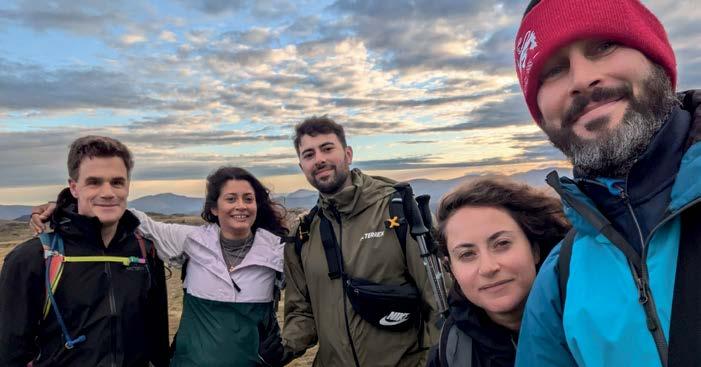
Alongside the 24 Peaks Challenge, SMB has hosted a variety of fundraisers, including a Halloween-themed event, a fantasy football league, golf social, and a cocktail evening that combined fun with fundraising.
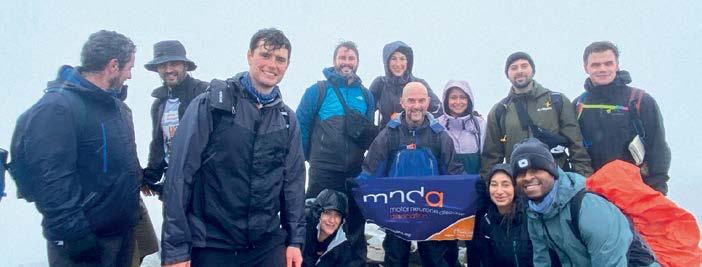

John said: “Having seen the impact MND can have and speaking to colleagues who have experienced this first hand I am delighted we are able to support the MND Association.”
This February is #PayrollGivingMonth, a dedicated month aimed at raising awareness of the vital impact of payroll giving on charities.
By providing a reliable source of monthly income, payroll giving enables charities like the MND Association to make solid plans and funding commitments.
Payroll Giving is a simple way to make regular donations straight from your salary. It is also one of the most tax effective ways of giving to charity, because it comes out of your gross pay (before tax) so it will cost you less. So, if you wanted to donate £5 per month to
the Association, it would actually cost you only £4 at the 20% rate of tax or £3 at the higher rate.
There is no need to provide your bank details because Payroll Giving is set up through your employer. Every time you’re paid, the agreed amount will be deducted from your salary and sent to the MND Association.
The Association’s Direct Marketing Manager, Alison Holmes said: “If you’ve decided to show your support for the MND Association this year, Payroll Giving is really convenient. Signing up is simple – just visit the dedicated page on our
website and we’ll do the rest, or speak to your HR payroll team at work.
“Any donation, big or small, has the power to make a huge difference to the lives of people living with this devastating disease both now, and in the future. To our existing payroll givers who have already chosen to support us in this way, thank you. Your money is now working even harder to further the Association’s work and we couldn’t be more grateful for your continued support.”
For more information about payroll giving visit our website at mndassociation. org/payrollgiving
The dedication, passion and hard work of our volunteers is integral to our work. Here we recognise some of our longestserving volunteers.
25 years and counting
In September, Andrew Hancock and Kevin Hara celebrated 25 years of volunteering for the Hull and East Yorkshire Group.
The Group held a special celebration, complete with afternoon tea at Tickton Grange in Beverley. The event was attended by local people affected by MND and the Association’s Head of Volunteering, Matthew Cobble who presented certificates and badges in recognition of their efforts over a quarter of a decade.
Dignitaries present included the Bishop of Beverley and the Lord-Lieutenant Jim Dick OBE (pictured here with Andrew (left) and Kevin (right)).
Andrew and Kevin were drawn to volunteering after a close friend Marjorie was diagnosed with MND. As Support Group facilitators, they have run the Group’s monthly support meetings, which allow people affected by MND to meet in a social environment.
Founder member celebrated
Janet Oliver (pictured, courtesy of Bury Free Press) has been involved with the MND Association since forming the Bury St Edmunds Branch in 1984. After this closed, she became
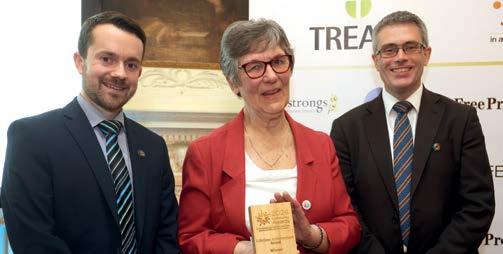
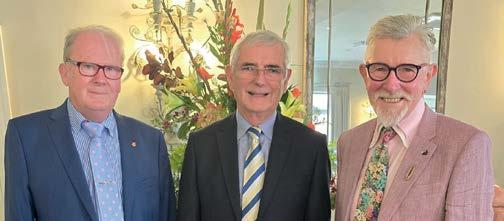
“It is difficult to describe their impact, as much of it is unseen. The daily phone calls, home visits, collecting funds from fundraising events and talks about our work – I cannot thank them enough for all that they do on behalf of the Association.”
Community Support Co-ordinator, Colin Pearson
involved in setting up the Suffolk Support Group and that’s not all she’s done in 40 years of volunteering. She’s been a branch committee member, Association visitor, and clinic volunteer.
Janet’s incredible commitment earned her a Lifetime Achievement honour at the Bury Free Press Community Awards, recognising her years of service with the Association. “Janet has been a consistent and active volunteer in Suffolk, ensuring that local support continues for those diagnosed with MND and their families. She is well known in the area among health and social care professionals, local charities and supporters as the local ‘face’ for the MND Association.”
Community Support Co-ordinator, Liz Cooper
Mary Dodds helped establish the Reading and West Berkshire Branch 37 years ago and was recognised as Community Champion at this year’s Pride of Reading Awards for everything she does for local families affected by MND.
“I am absolutely thrilled to see Mary recognised for her unwavering dedication and years of volunteer work. Mary’s incredible commitment to supporting those affected by MND and her tireless efforts to raise awareness and funds have made a profound impact in the community. Congratulations Mary – it’s so well deserved!”
Relationship Fundraiser, Luke Robson
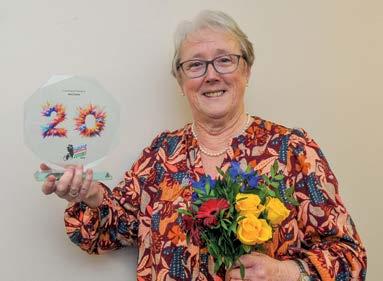
£2,055

to coast challenge
Kev Chisholm cycled 130 miles, coast to coast from Workington to Tynemouth, dipping his wheel in the sea at the finish! His fatherin-law Ray who died from MND in 2022 is Kev’s inspiration to help find a cure.
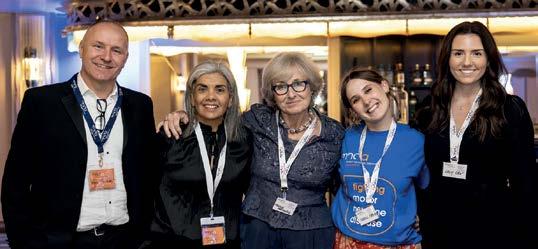
£5,000
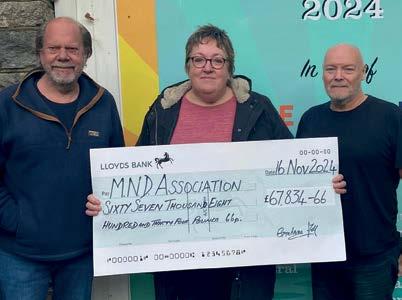
£70,000
Last summer, John Caulcutt hosted his 59th charity Towers Party at home in Yarmouth on the Isle of Wight, with funds raised in memory of his wife Sas who died from MND in September. It was attended by nearly 1,700 people and among the groups playing was John’s own band of 50 years, Step on the Gas. Thanks to generous donations from family and friends, the party raised nearly £70,000 with a £20,000 trust donation expected. A huge thank you to John, his friends and family.
Share your pictures at www.facebook.com/ mndassociation
If you are sending in photographs to feature on these pages please ensure you have full permission to use the images.
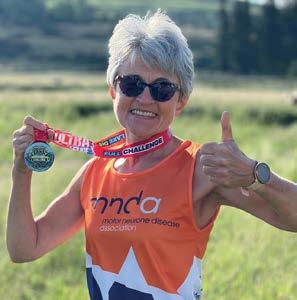
£2,760
Lake District Ultra Mary Phillips took part in the Lake District Ultra Walking Challenge across 100km of tough terrain and with 2,500m elevation over 22 hours and raised a fantastic £2,760.
In September, UK Finance’s annual members’ dinner supported the MND Association, represented on the night by members of the North London Branch. During the event, one of the branch members delivered a moving speech, silencing the room as she highlighted the devastating impact of MND on those living with the disease and their families. The evening raised £5,000.
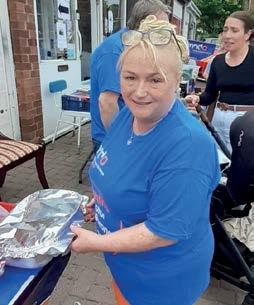
£4,700
In September, AnneMarie Plant and her amazing neighbours organised a street community fete in honour of Anne-Marie’s husband David who is living with MND. Anne-Marie brought everyone together and created a special and memorable day. The fete raised over £4,700.
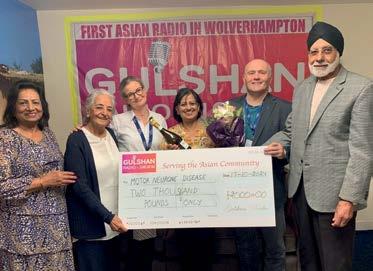
£2,000
Gulshan Radio Wolverhampton’s presenter, Harjinder Juttla, took on a sky dive to raise money for MND research. Harjinder, who is also an Association visitor for the Black County Group said: “It was on my bucket list of things to do for a good cause. Every little helps in the fight against MND.” Members of the fundraising team received a cheque for £2,000 and Harjinder interviewed them about their work for people with MND which currently affects around100 people across the Black Country.
If you’ve been inspired to take part in a fundraising event for the Association, there are loads of ideas to make a difference at www.mndassociation.org/fundraising

£18,000
Kilimanjaro adventure
Friends Laurence, Mike and Dan took on the epic challenge of climbing Kilimanjaro – the highest mountain in Africa. The trio, all directors at Frontier Consulting, raised over £18,000. Their challenge was inspired by Laurence’s friend John Ryan a former rugby captain and coach at Hendon RFC and the team took John’s shirt up the mountain with them. 50% of the money raised will go to the Hull and East Yorkshire Group, to support local families affected by MND.
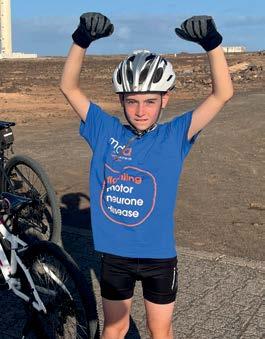
£1,598
A kind-hearted boy
After his dad’s friend was diagnosed with MND, eight-year-old Flynn wanted to show his support in a big way. He cycled 100 miles offroad on his mountain bike with his dad over six days, completing the final leg while on holiday. Dad, Ben said: “I’m super proud of Flynn, it’s such a kind and thoughtful thing to do for others.”
Flynn raised an impressive £1,598.
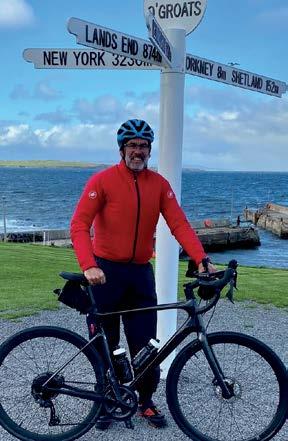
£2,500
Trevor Thurlow completed an incredible Land’s End to John O’Groats cycle ride, in memory of his friend Mark. He battled a wide range of terrains and weather conditions, completing 1,006 miles with 64,771 feet climbed – all in 19 days to raise £2,500.
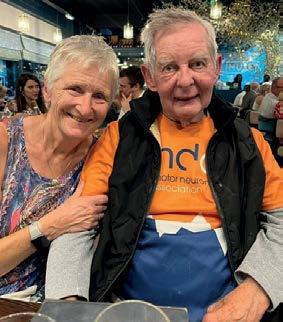
£7,047
In memory of Bill.
Bill and Deidre Bethune took on the Run 60 Facebook challenge in September with Bill clocking up miles in his wheelchair and Deidre walking every day, including on their 53rd wedding anniversary. The couple raised £7,047. Sadly, Bill died shortly after the challenge on his 82nd birthday. Deidre said: “It gave him something to aim for and made us resolve to at least go for a good walk everyday.”
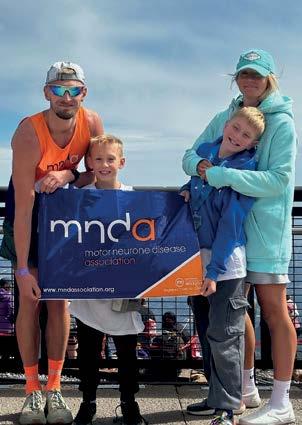
£14,151
Rocky mountain high James Deytrikh whose dad and uncle both died of MND conquered the Pikes Peak Ascent Race, a gruelling 14,115 ft climb from Manitou Springs in Colorado to the summit of Pikes Peak in the American mountains, raising a fantastic £2,850.
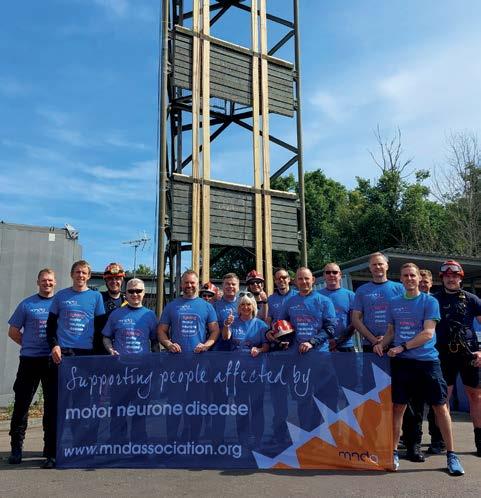
£2,151
Essex County Fire and Rescue Service witnessed first-hand the impact of MND on a close colleague’s dad and his family. Our Colchester and North East Essex Branch provided support to the family and to show their appreciation, the fire officers organised a fundraising event at their training tower, climbing up and down the equivalent of the UK National Three Peaks Challenge and raising a fantastic £2,151 for the local branch.
If you have something you would like to share with other members of the MND community, we would love to hear from you. Letters, which must include your full address, can be sent via email to editor@mndassociation.org or posted to Your letters, Thumb Print, Francis Crick House, 6 Summerhouse Road, Moulton Park, Northampton, NN3 6BJ
Please note that letters may be edited. If you are including photographs please ensure you have full permission before sending.
We share lots of information, advice and updates on our social media channels which also give you the chance to interact with other members of the MND community and share your own experiences.
Our Facebook page is a thriving hub for all things MND Association. You can engage with our updates and stories, sign up for fundraising events and talk to other people with and affected by motor neurone disease. facebook.com/mndassociation
Over on X, formerly Twitter, you’ll find the very latest information about research, campaigning and the support we provide. We regularly link to news, our #TeamMND fundraisers, and information on our website, so it’s a great one-stop-shop. x.com/mndassoc
As you’d expect, the MND Association’s Instagram feed is full of inspiring pictures telling the story of the MND community. We also share videos and lots of inspiration if you’d like to get involved with our work. instagram.com/mndassoc
The latest addition to our social media feeds is TikTok where you’ll find a host of videos charting everything from the antics of our mascot Buddy, to people with MND sharing their experiences, to fundraisers showing just how inventive they can be when it comes to raising money and awareness. We get involved with some of the latest Tiktok trends too!
tiktok.com/@mndassoc
For those keen to find out more about the business side of the organisation, our LinkedIn feed shares opportunities to engage with the charity, our collaborative efforts and recruitment updates. linkedin.com/company/mndassociation
The MND Association is committed to minimising impact on the environment. Our fully recycled paper wrap is 100% sustainable and the most environmentally friendly solution available. Thumb Print is printed on paper sourced and certified by the Forest Stewardship Council (FSC) and is carbon balanced – offset by The World Land Trust – an international conservation Charity committed to buying and protecting environmentally-threatened land throughout the world.
When I leave this place
I shall have big plans.
I will dance around my garden
In bare feet
Wearing floaty dresses
Ankle chains
And Crystal bracelets.
It will be eternal summer.
I will sit under a tree on the embankment of the river
And make daisy chains
And feed the squirrels
And the ducks
And the geese.
I will sit outside cafes
And drink cappuccino
And eat pizza and pasta.
I will visit St Ives
And sip cocktails in the sun
I will sit on the beach and paddle in the sea.
And in the evening
I will sit in Kitty’s corner
Wrapped in a blanket
Watching the moon and the stars.
And along the way
I will leave shells
And feathers
And interesting rocks
For you to find.
I will send robins
And ravens
Dragonflies and butterflies
Just to let you know I’m there.
I will collect sticks
And fill my pockets
With pinecones and acorns
I will wear floppy hats and film star sunglasses
I will sit on the sofa and hold my husband’s hand
Even though he won’t see me
I hope he’ll know I’m there.
I will proudly watch my children and grandchildren grow and blossom.
I will be me again
I have big plans.
by Raven (Karen Playle) who was diagnosed with MND in August 2023 and sadly died in December
People from black and indigenous backgrounds are being invited to join a new online support group hosted by the MND Association.
“As someone who will be running this group, I understand that living with MND can present unique challenges that are deeply connected to our cultural, social and personal experiences.”
Abigail Igbokwe, Community Support Co-ordinator
This group aims to provide a sense of community for those who may feel isolated or underrepresented in traditional support settings.
The monthly online meeting will be a safe space for people living with MND and their families to:
• Connect and share experiences with others who are facing similar challenges.
• Learn about support the Association can offer.
• Access mutual support.
If you are interested, or know someone who might benefit from joining, please contact Abigail.igbokwe@mndassociation.org
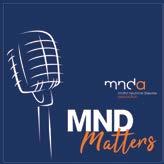
With more than 30 episodes available, the Association’s MND Matters podcast offers a wealth of information and insight from experts and members of the MND community. Dive into the library of episodes at any time to hear informal advice, information and real-life experiences about a range of topics including family support, travelling with MND and fundraising tips.
Listen to all episodes on our website at www.mndassociation.org/mndmatters or search MND Matters wherever you get your podcasts.
Episode 23 (1) – Luke’s Fundraising story
Recorded to mark our campaign #TakeOverMND, we met fundraiser Luke Robson who was mid-way through his incredible challenge of running 5k every day for a year. Our host, Helen, chats with Luke about his inspiration – his mum, who is living with MND –and his drive to keep running on those difficult days.
Episode 19 – Travelling with MND
Hear top tips for accessible days out from Ken Blackburn, who is living with MND, and Antonia Lee-Bapty from Euan’s Guide. Ken and Antonia share how MND can make getting out and about more difficult but suggest ways to overcome those potential challenges.
Episode 2 – Family Support
Hosts Steph and Nick speak to Megan Donoher, whose dad was diagnosed with MND in April 2020. Megan gives a moving account of the impact his diagnosis had on her family and the tailored support she’s received from the Association’s children and young person’s service. They’re joined by Laura Willix, Children and Young Person’s Development Manager at the MND Association. Since recording, Megan’s dad, John, sadly died. We are grateful to Megan and her family for giving us permission to continue sharing this episode.
The Motor Neurone Disease (MND) Association
We improve care and support for people with MND, their families and carers, and fund and promote research that leads to new understanding and treatments.
We also campaign and raise awareness so the needs of people with MND and everyone who cares for them are recognised and addressed by wider society.
As a charity we rely on voluntary donations. Our vision is a world free from MND.
Online forum A place for people affected by MND to share experiences and support each other. https://forum. mndassociation.org mndassociation mndassoc mndassoc

Our MND Connect helpline offers advice, practical and emotional support and signposting to other organisations. Please note our revised opening times: Monday to Friday 9am to 4pm
0808 802 6262 mndconnect@mndassociation.org
To receive a regular copy of Thumb Print, call 01604 611860 or email membership@ mndassociation.org
If you would prefer to receive your copy of Thumb Print under plain cover please let our membership team know.
